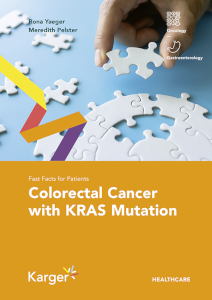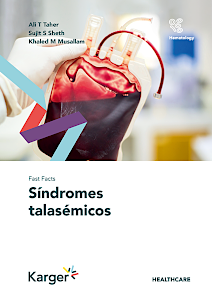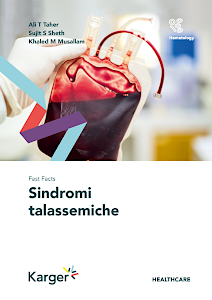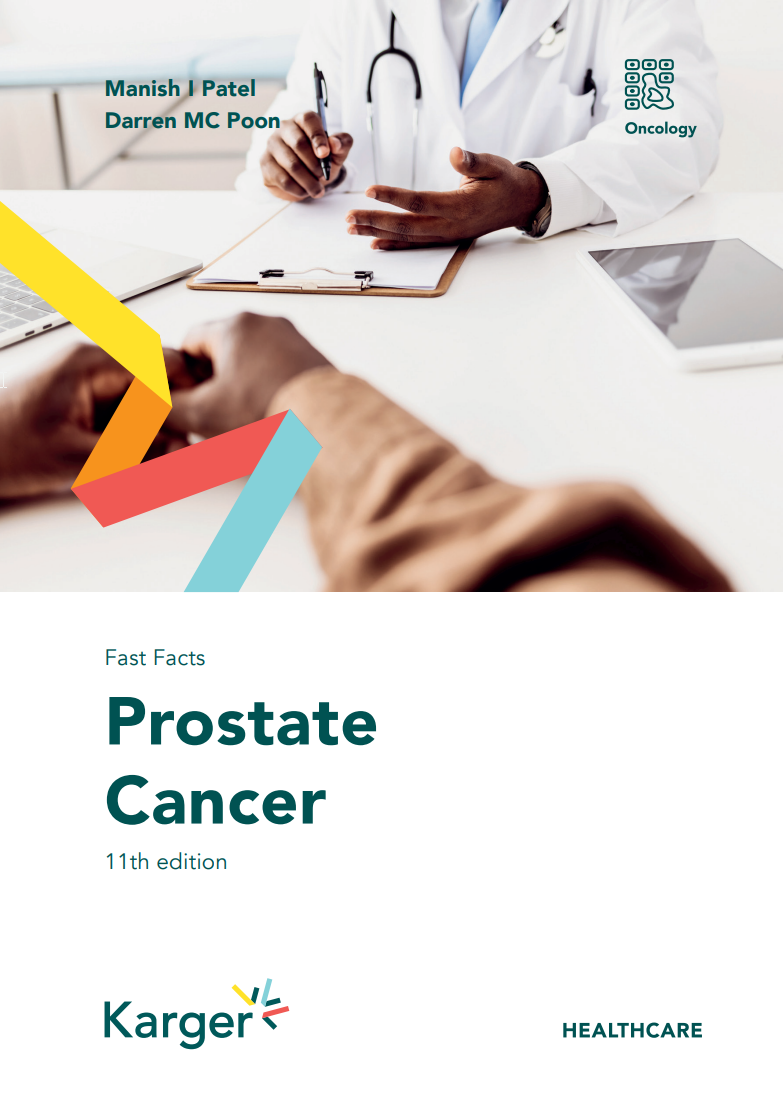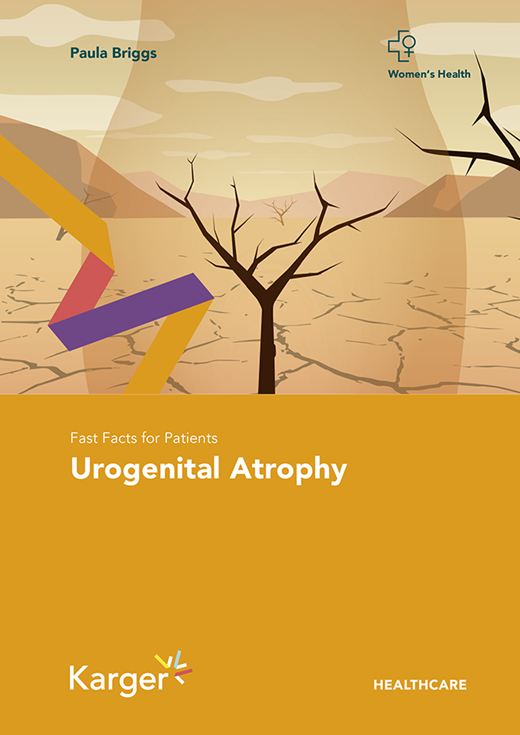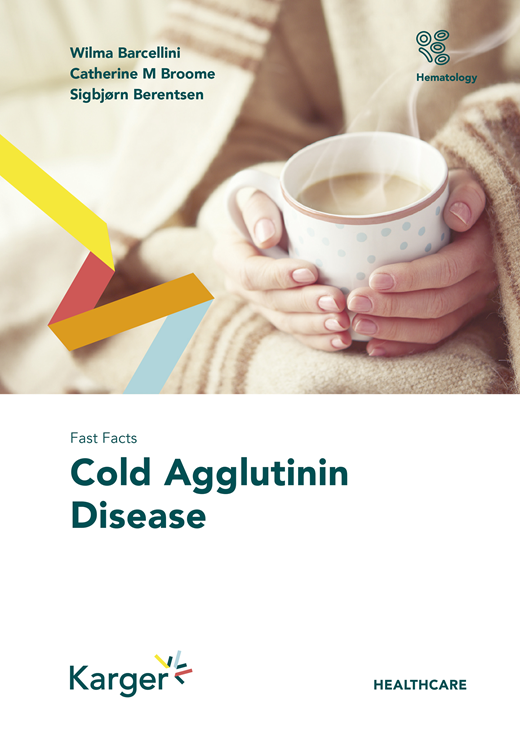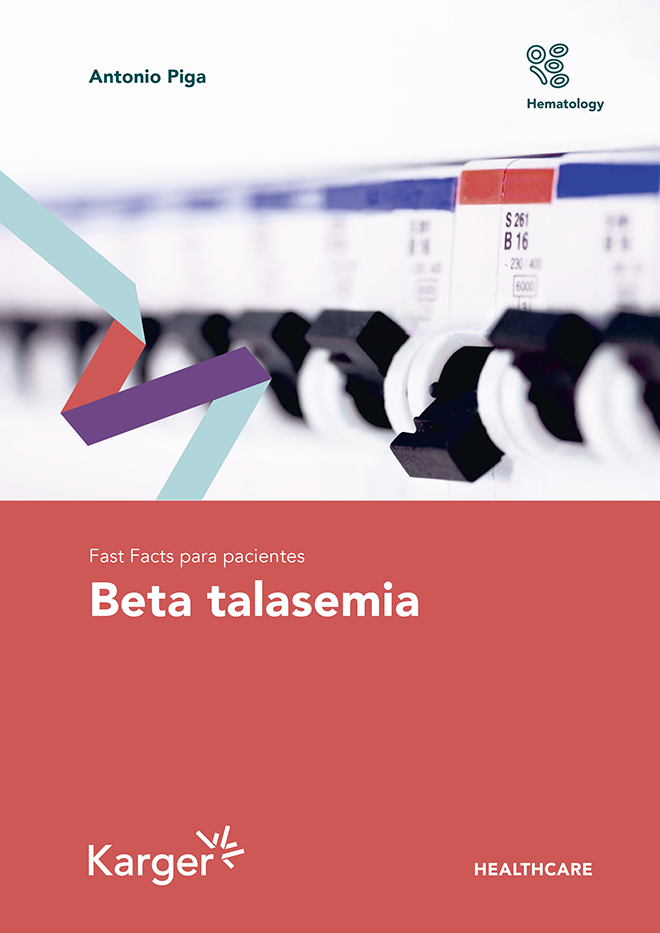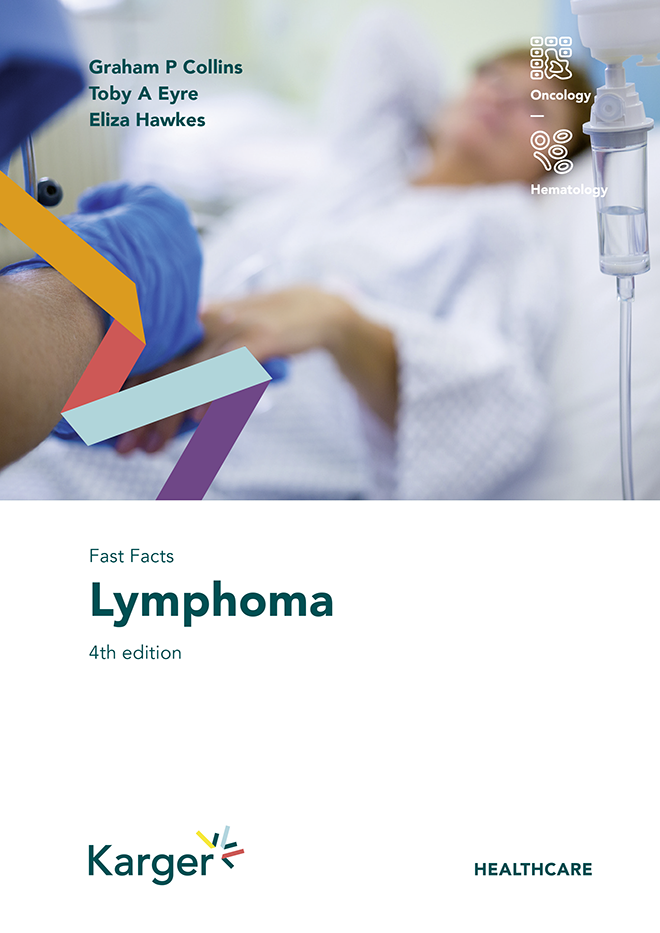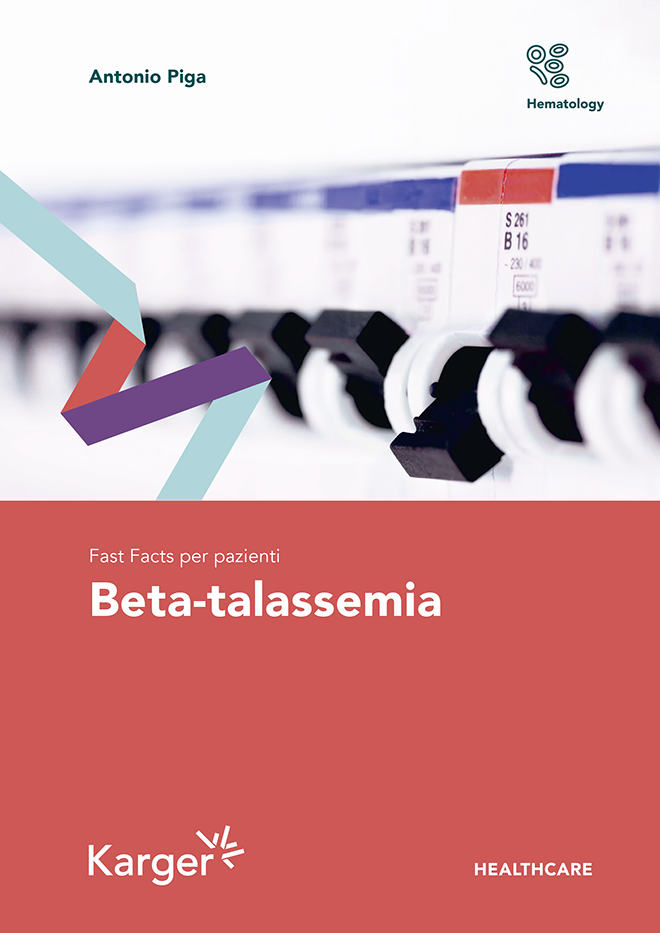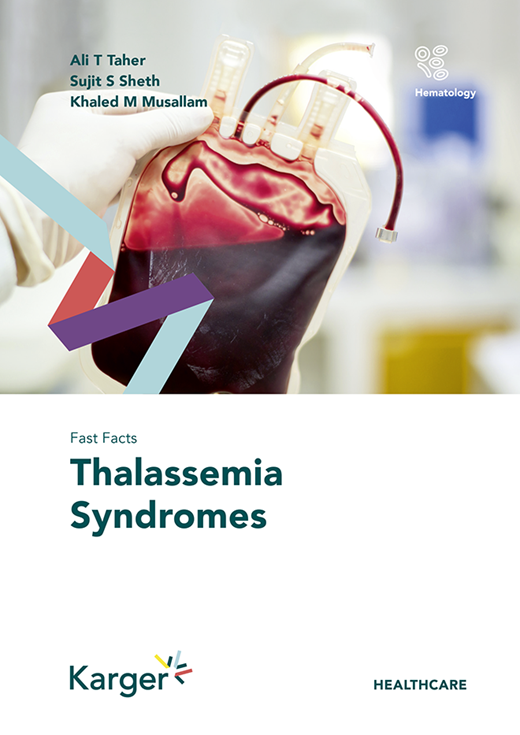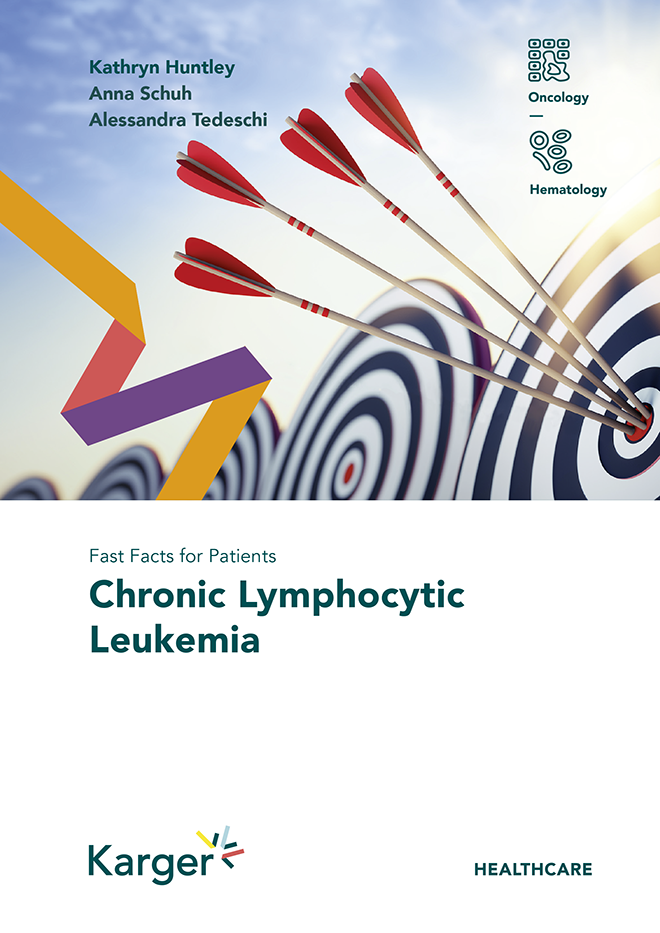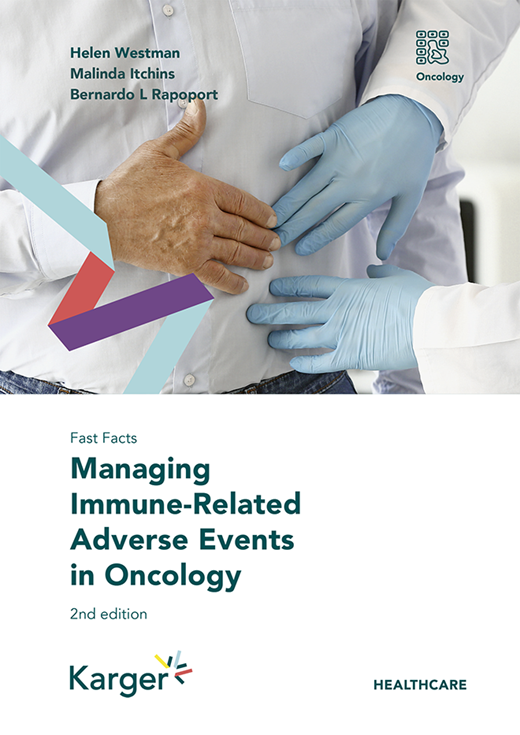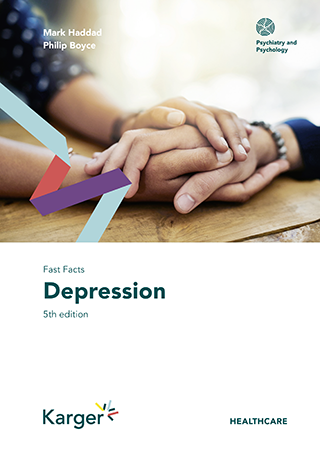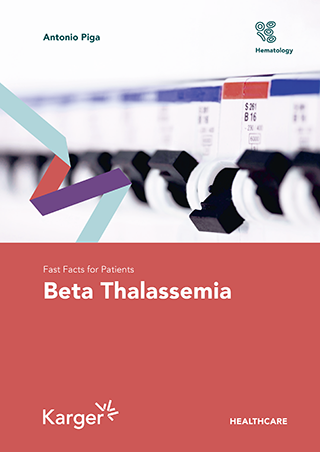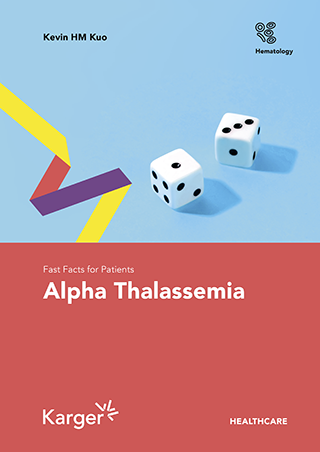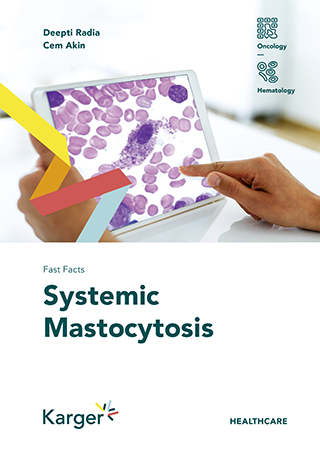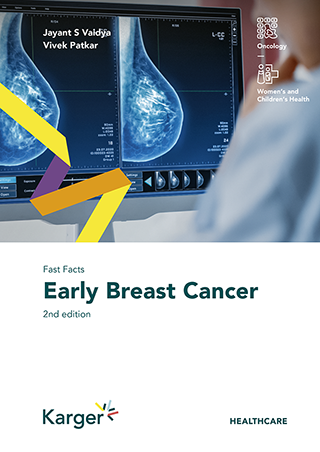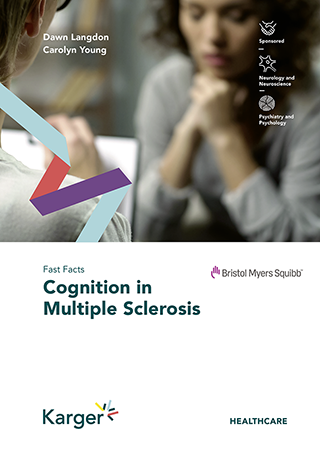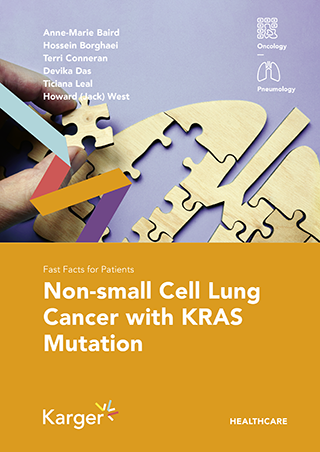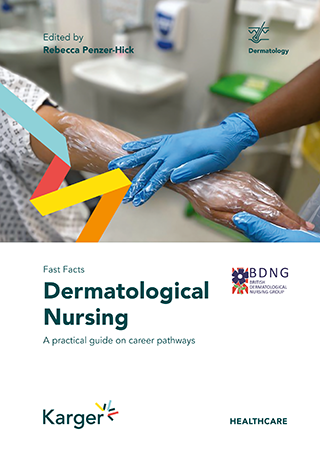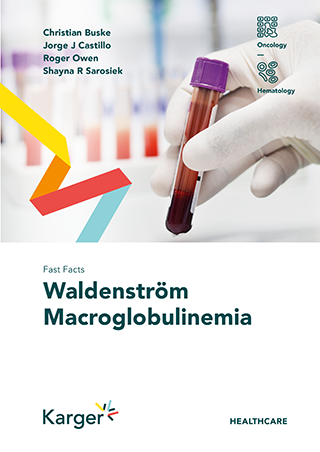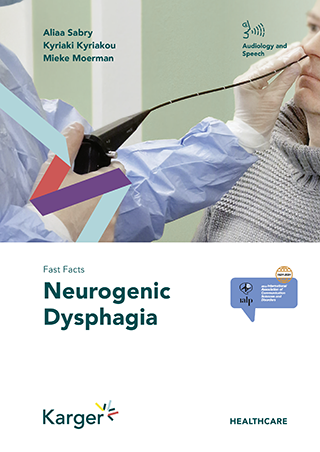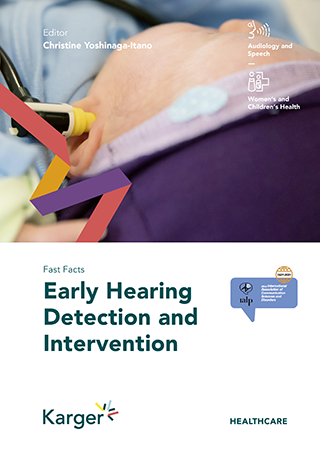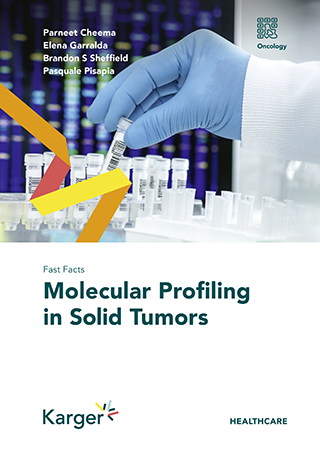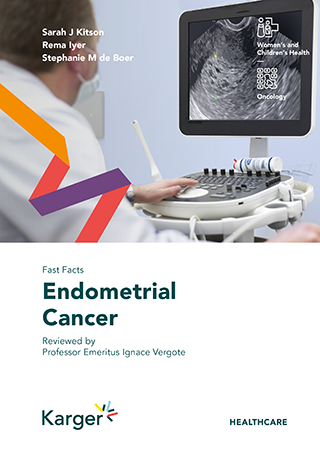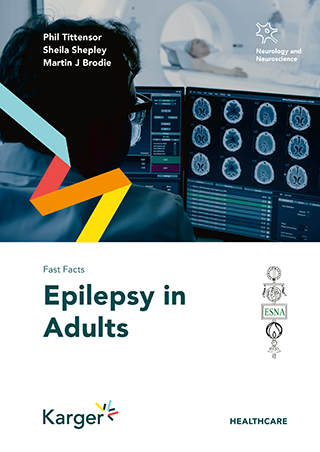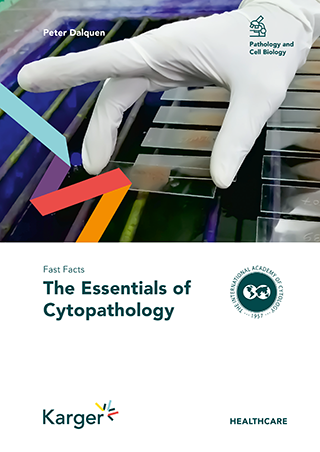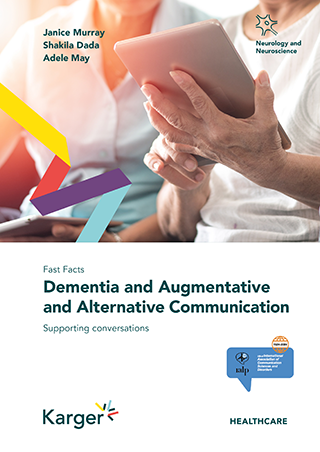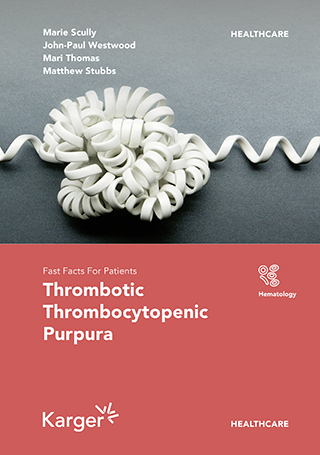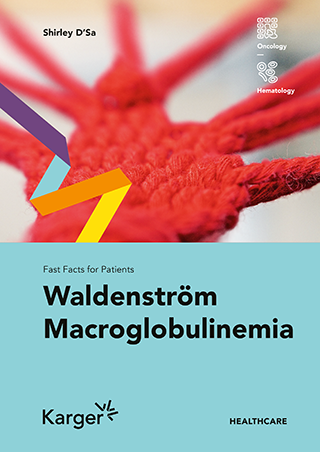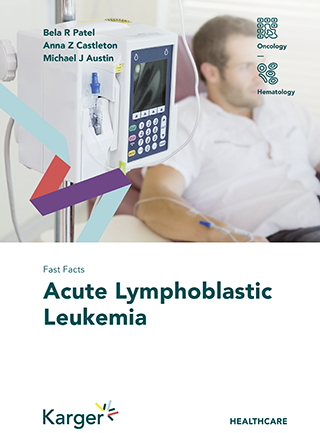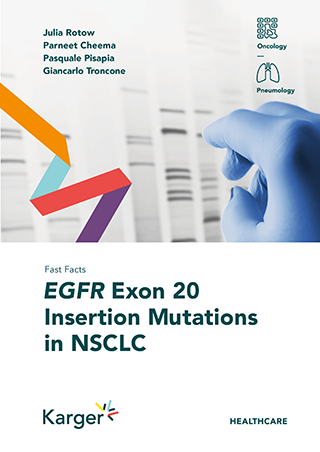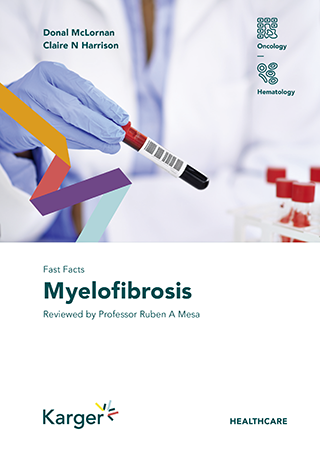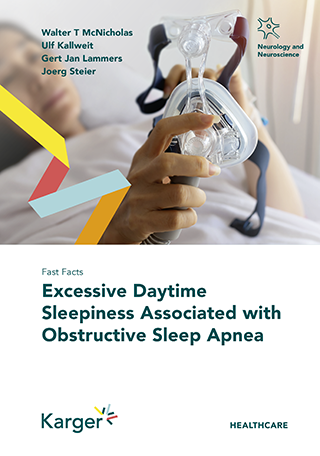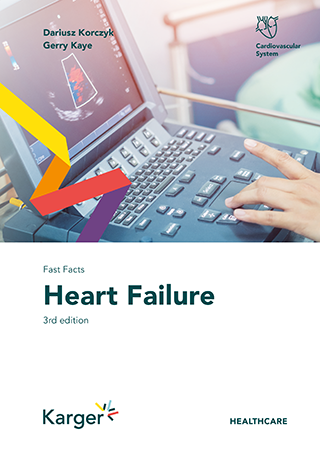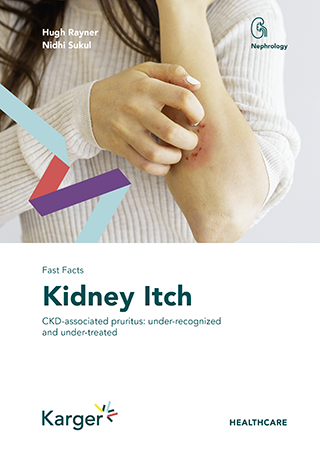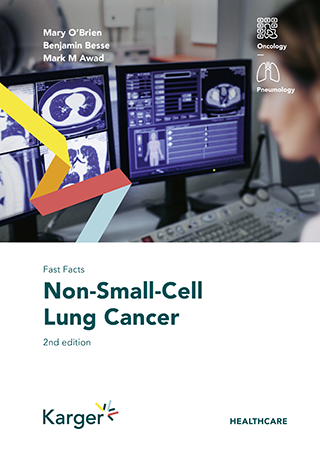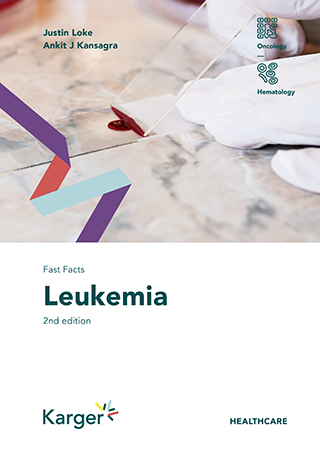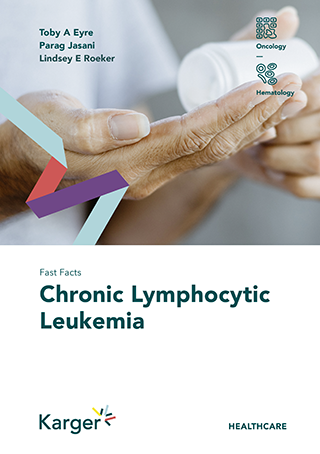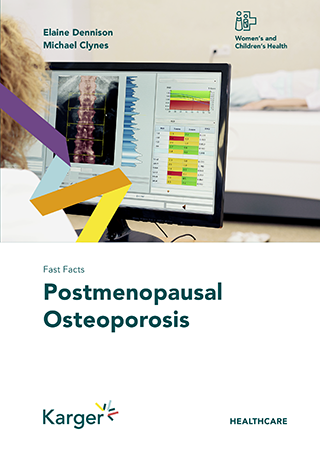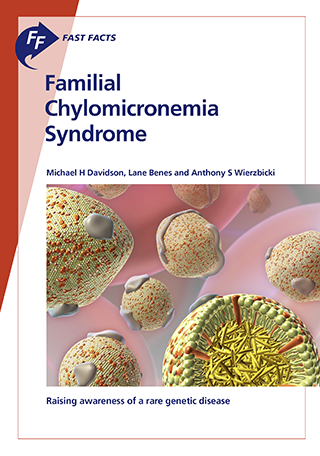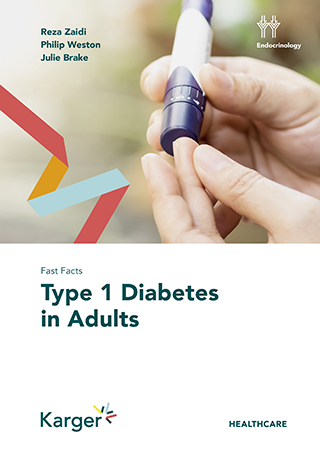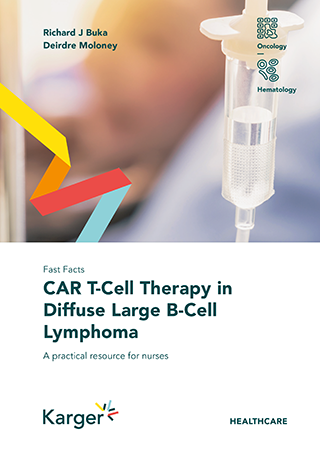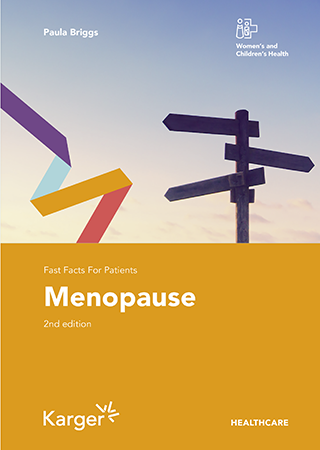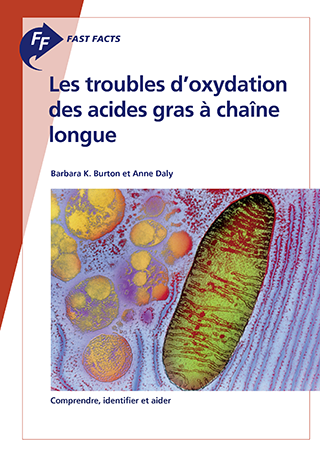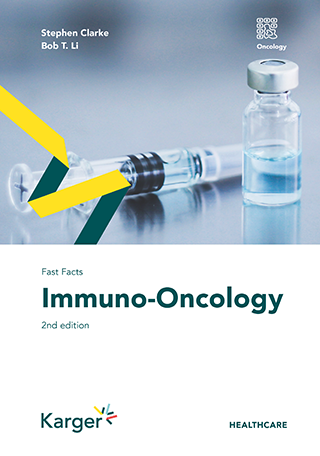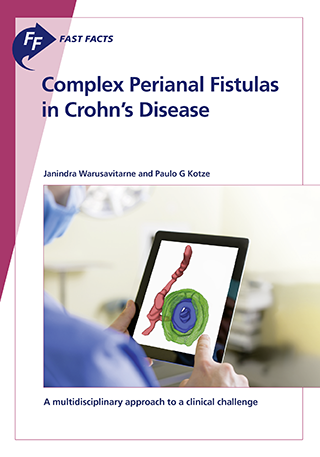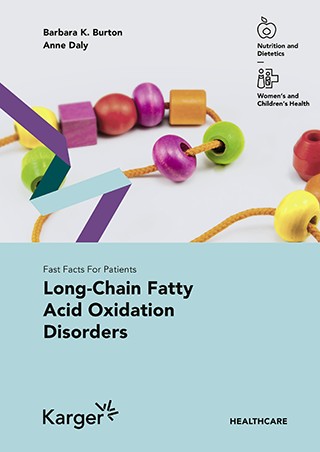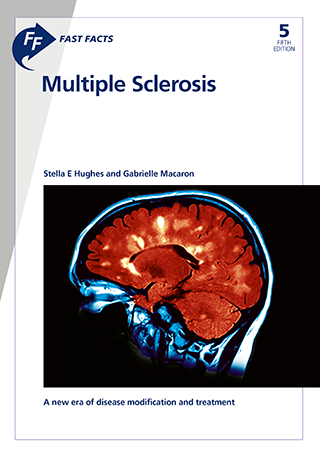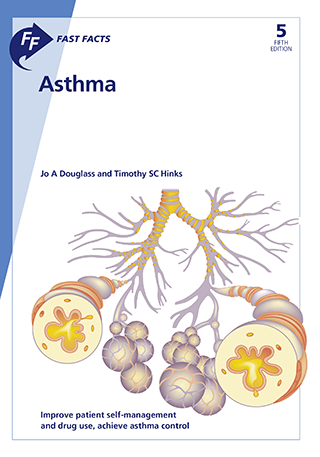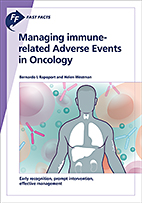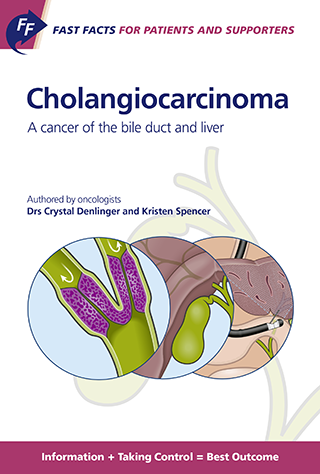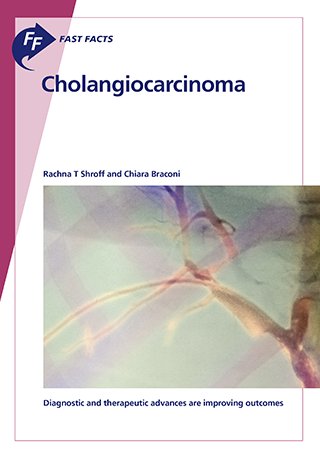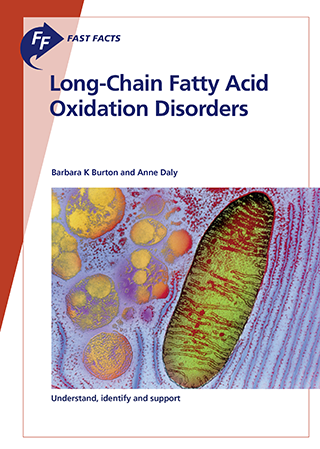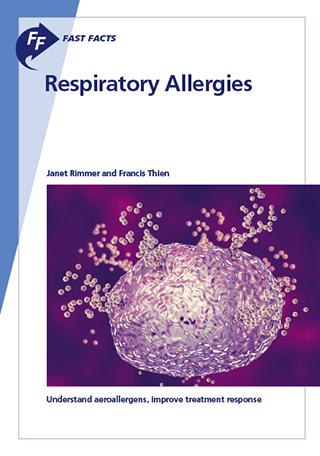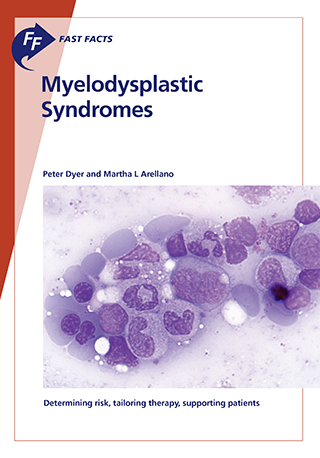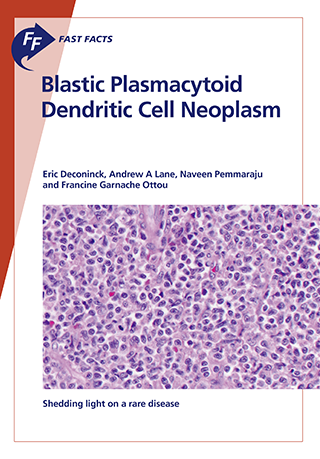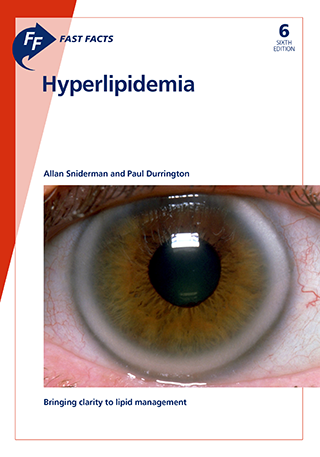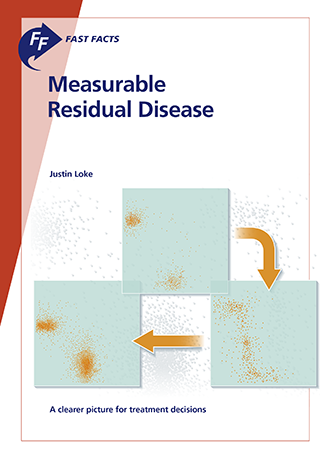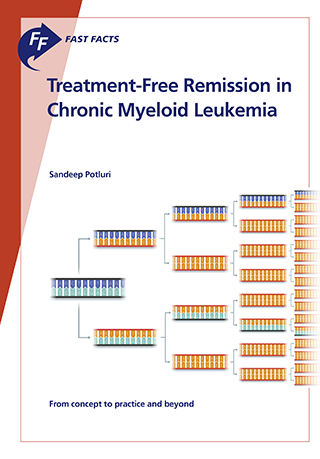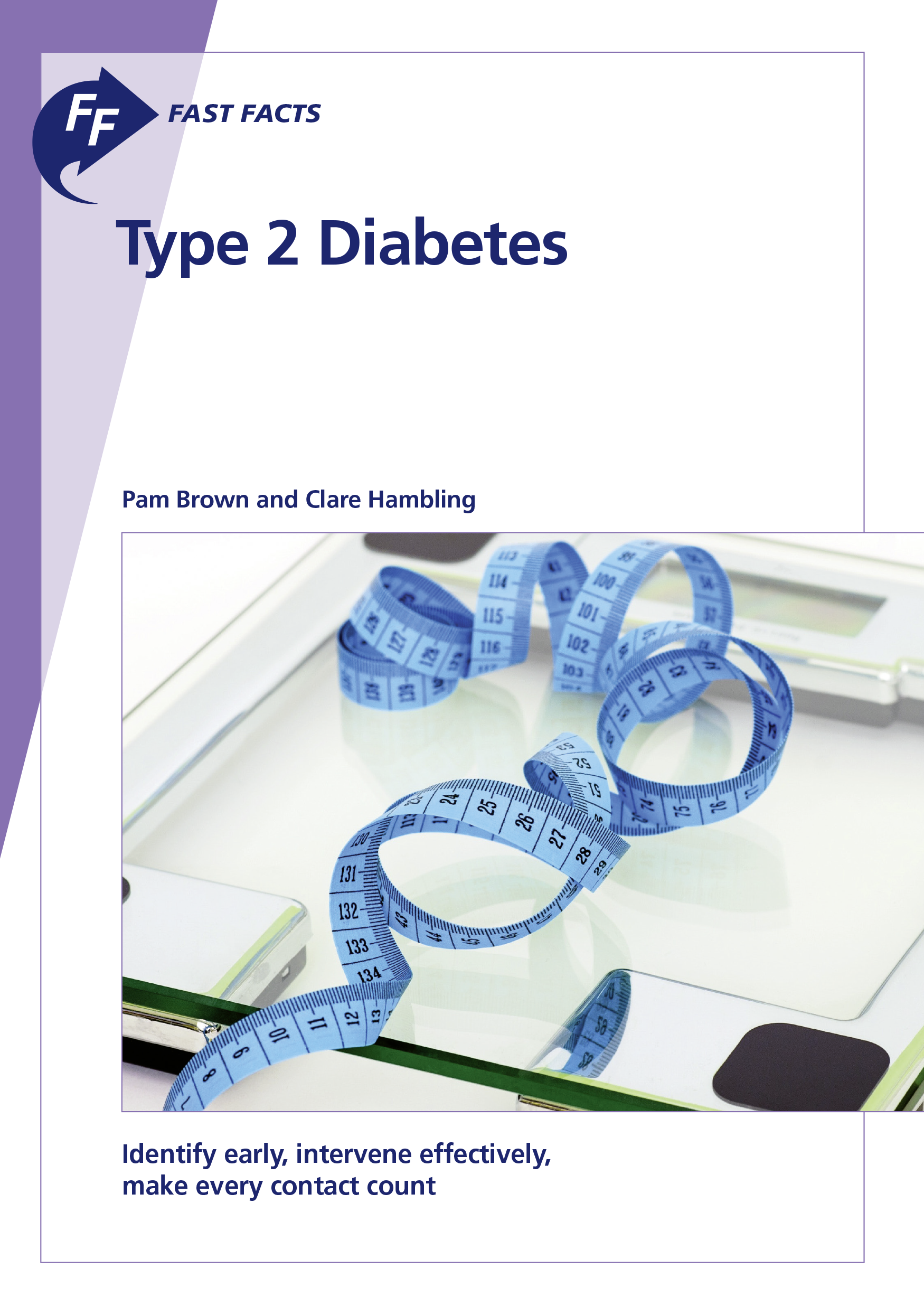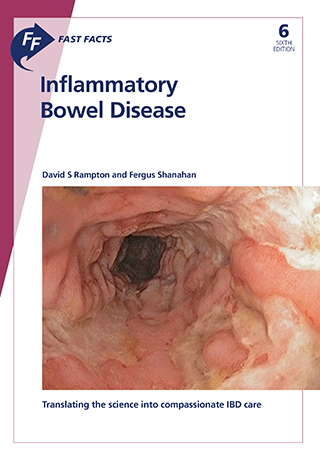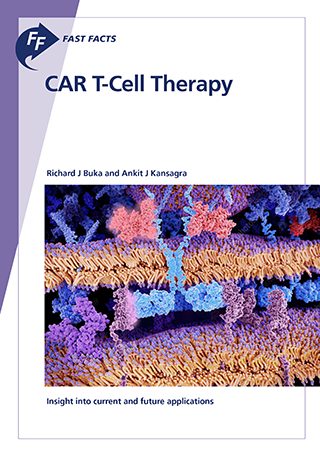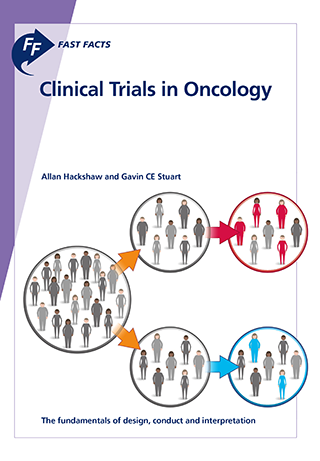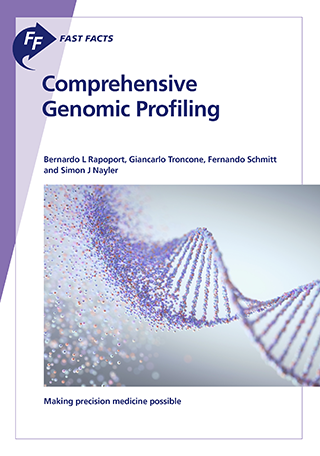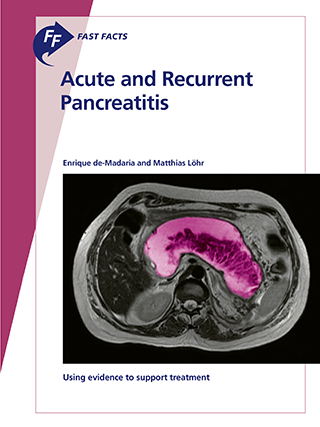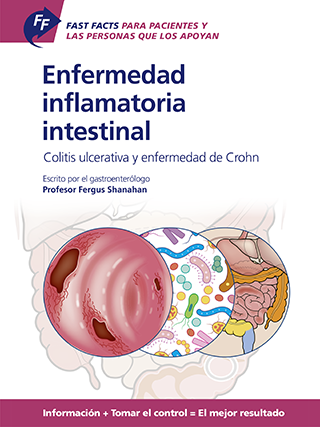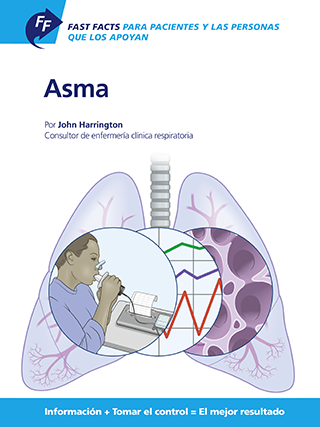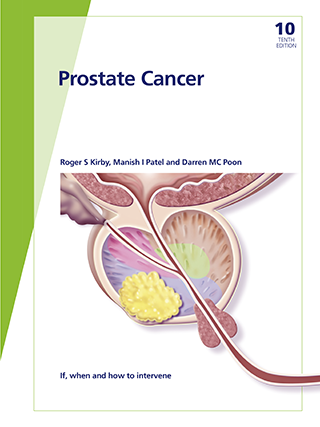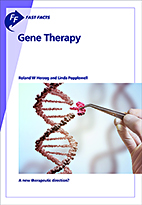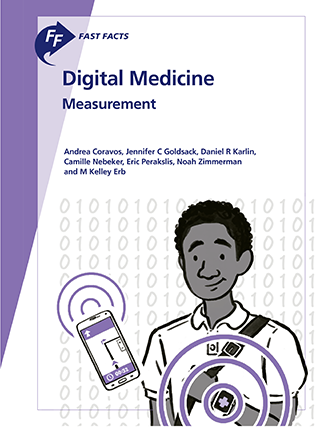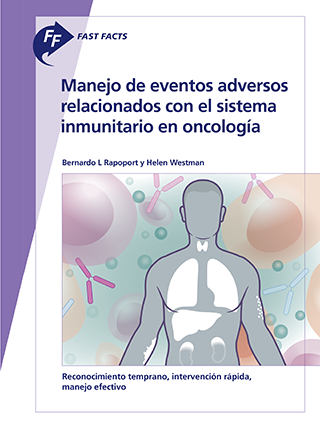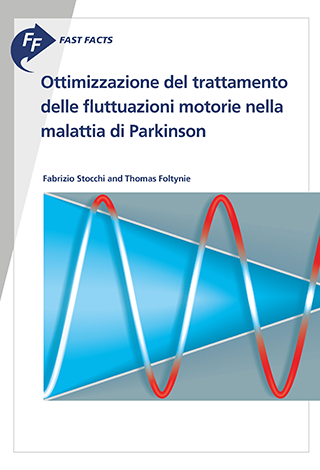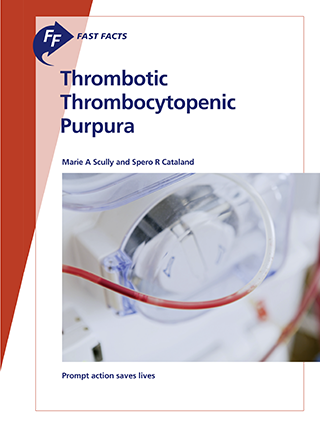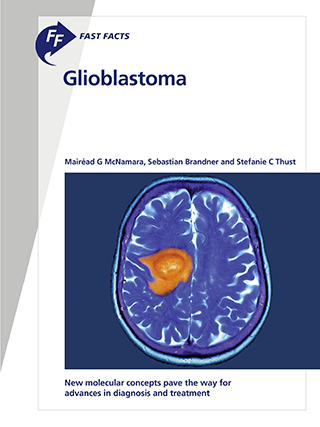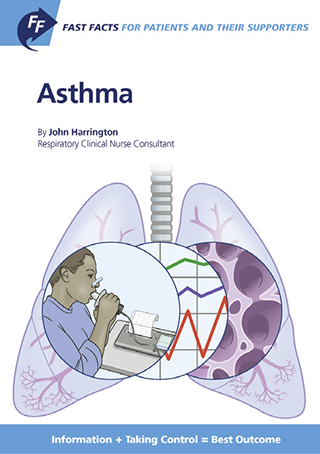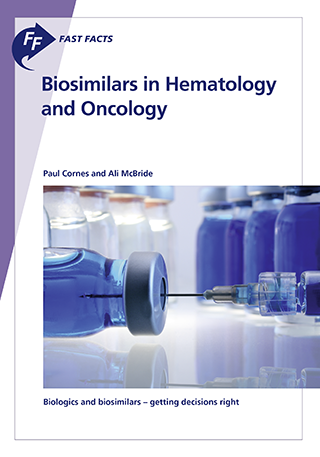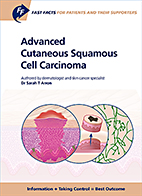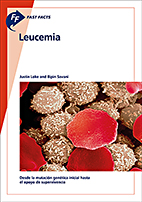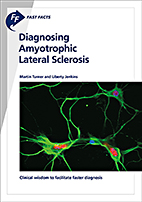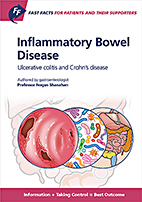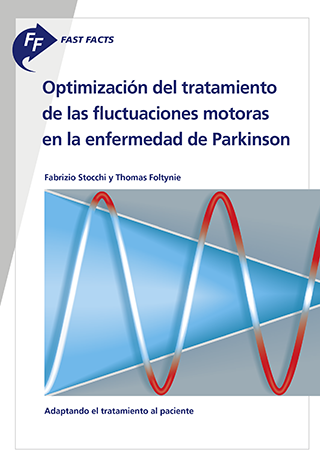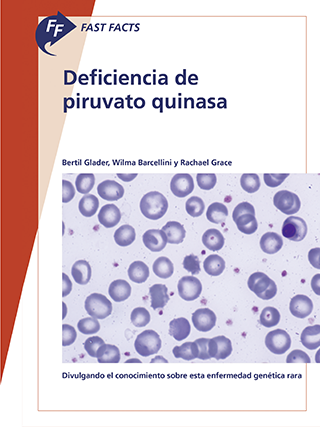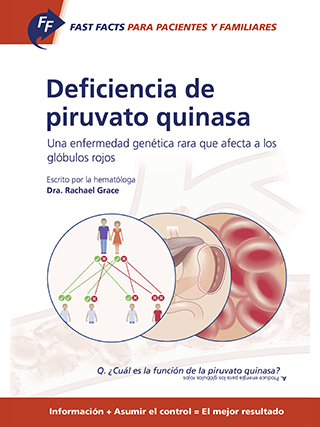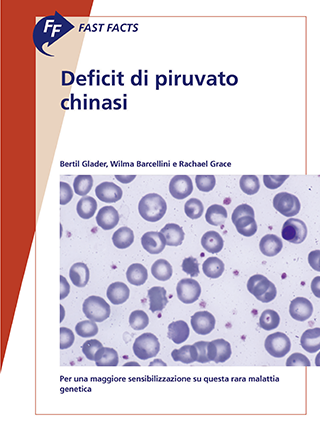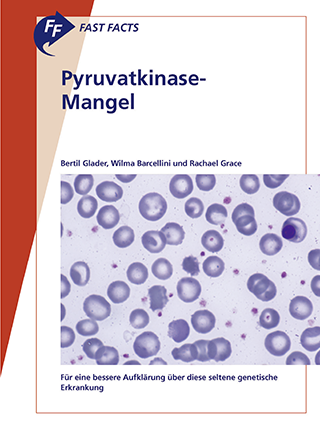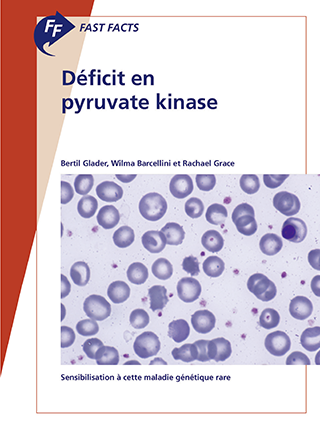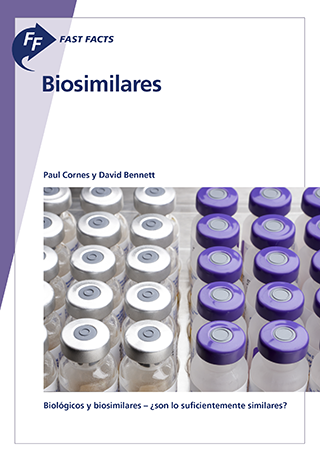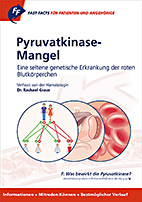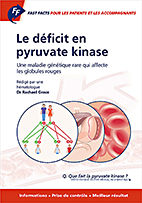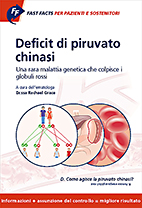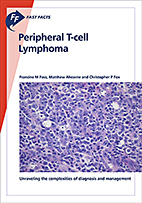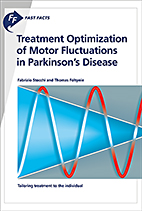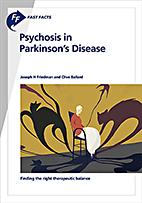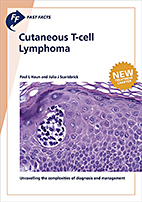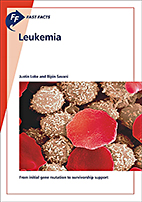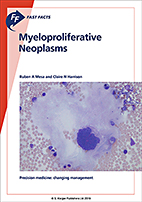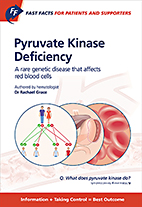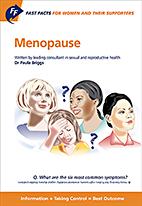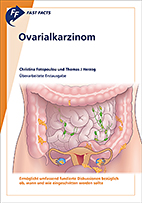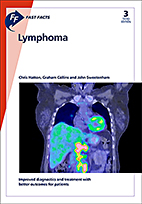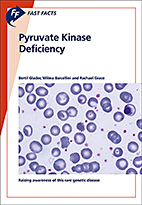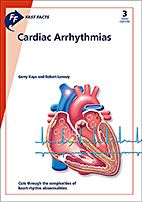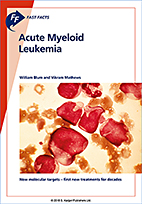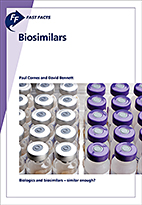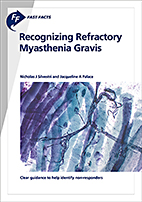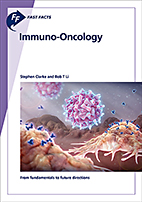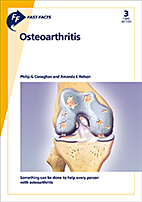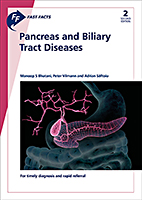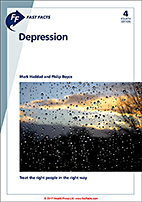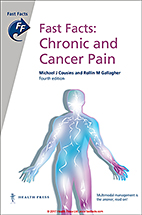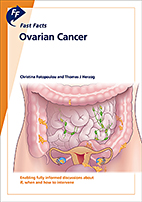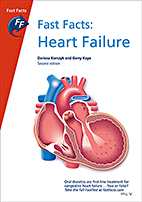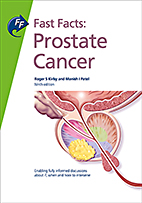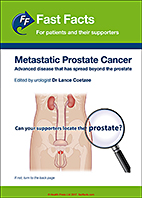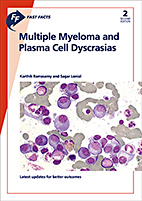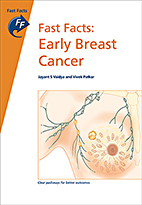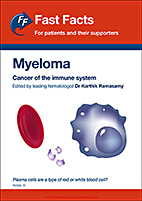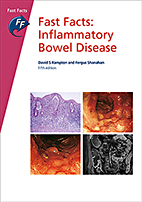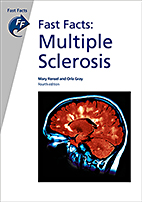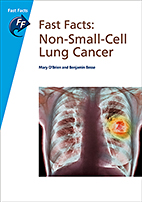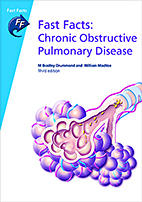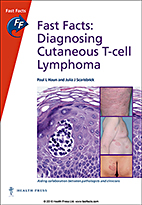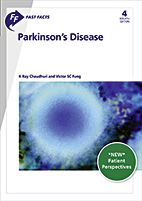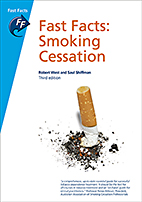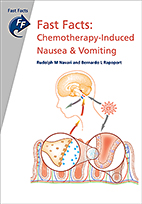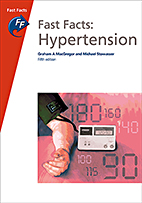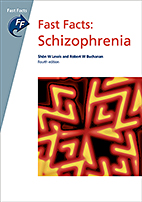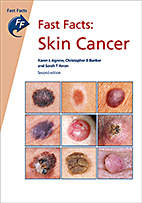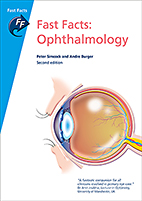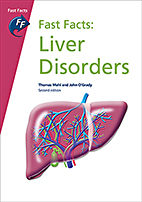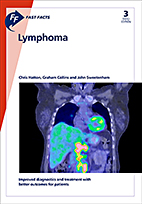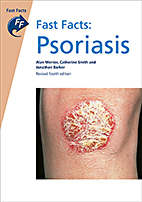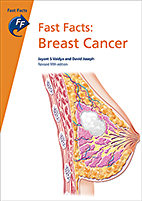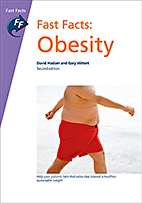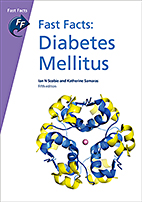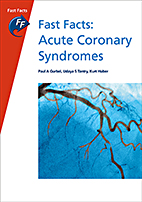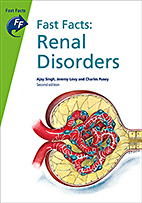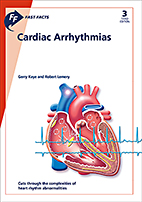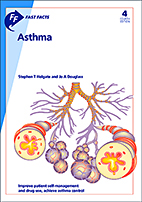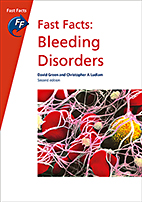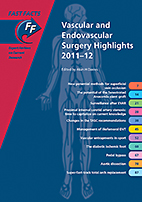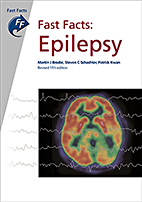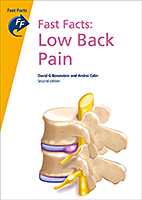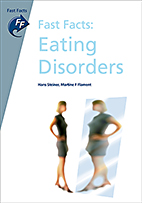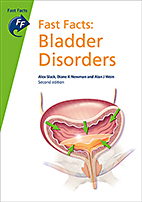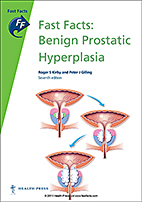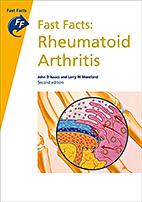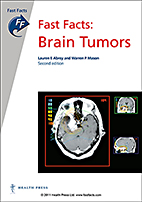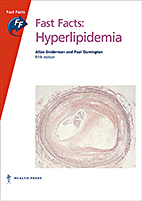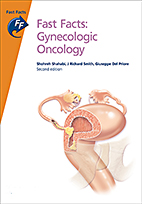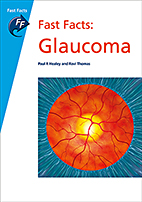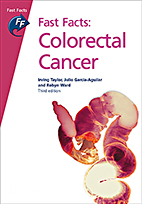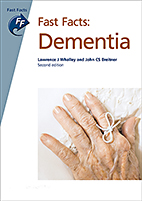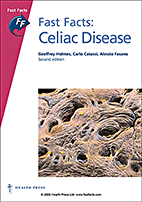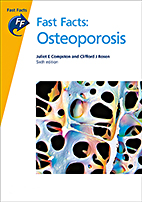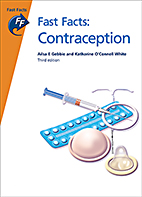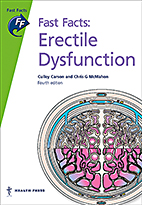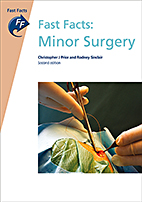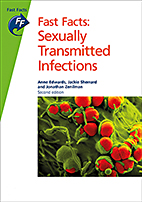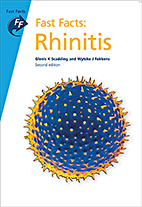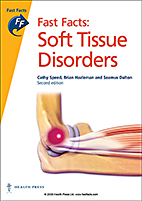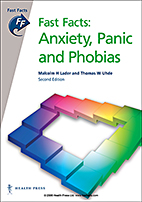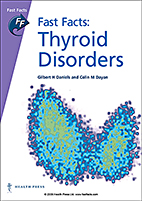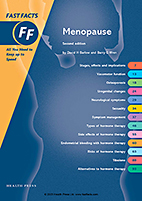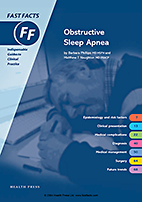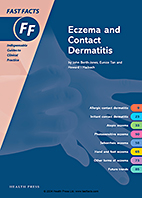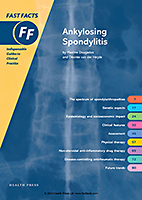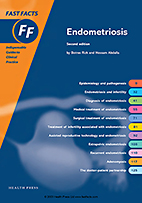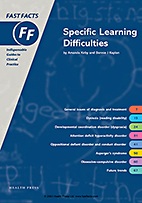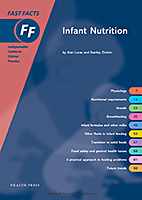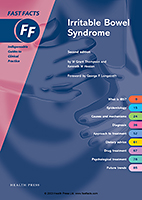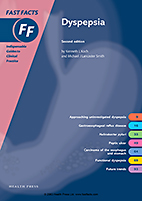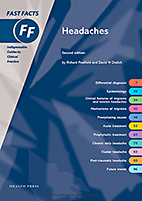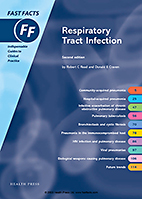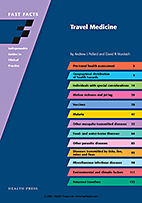Skip Nav Destination
Fast Facts Titles
Search Titles
Language
Audience
Subject Areas
Results
We did not find a title matching your criteria. Try to adapt or reset your filters.
Fast Facts for Patients: Colorectal Cancer with KRAS Mutation
Colorectal cancer (CRC) is cancer that begins in the colon or rectum of the digestive system. KRAS is a protein that sends signals to cells telling them to divide. In healthy cells, KRAS can be switched on and off. In some cancer cells, gene mutations cause changes in the KRAS protein that mean it is constantly switched on, driving cells to divide. KRAS mutation status can be used to guide treatment decisions. New treatments that target a KRAS mutation have been approved for non-small cell lung cancer and are now being tested for CRC. Other treatments are also being developed.
Fast Facts: Síndromes talasémicos
'Fast Facts: Síndromes talasémicos' proporciona una introducción detallada y concisa a los síndromes talasémicos y a los enfoques actuales para su tratamiento y el de las enfermedades asociadas. También ofrece información sobre algunos de los nuevos tratamientos que se cuentran actualmente en fase de estudio en ensayos clínicos o que se han aprobado recientemente, y que pueden tener el potencial de transformar la vida de los pacientes con talasemia.
Fast Facts: Sindromi talassemiche
'Fast Facts: Sindromi talassemiche' offre una presentazione concisa e completa delle sindromi talassemiche e delle opzioni attualmente disponibili per il trattamento delle talassemie e delle comorbidità associate. Inoltre, fornisce informazioni su alcune nuove terapie attualmente oggetto di studi clinici o approvate recentemente, potenzialmente in grado di cambiare la vita dei pazienti talassemici.
Fast Facts: Prostate Cancer
Prostate cancer is the second most common cancer in men worldwide, but it is unusual among solid tumors in that many men die with, rather than of, the disease. This raises challenges in terms of deciding if, when, and how to intervene to control tumor growth and spread in order to extend survival without compromising quality of life.
Fast Facts for Patients: Sexual and Reproductive Health After Gynaecological Cancer
This patient booklet was written for women undergoing treatment for gynaecological cancer. It aims to provide an understanding of the possible side effects of treatments, with a particular focus on sexual health, intimate relationships, and reproductive wellbeing.
Fast Facts for Patients: Urogenital Atrophy
Urogenital atrophy is caused by low levels of oestrogen and is mostly associated with the menopause. Symptoms can include a dry vagina and thinner vulval skin which leads to painful sex and bladder problems. The condition is very common although many women mistakenly believe the symptoms are an inevitable part of ageing and do not seek treatment.
Fast Facts: Cold Agglutinin Disease
Cold agglutinin disease (CAD) is a rare, autoimmune hemolytic anemia in which cold-reacting autoantibodies (cold agglutinins) bind to normal antigens on the surface of red blood cells during passage through the cooler peripheral circulation.
Fast Facts para pacientes: Beta talasemia
La beta talasemia es una enfermedad congénita de la sangre, es decir, se nace con ella. Afecta a sus glóbulos rojos. La beta talasemia es una enfermedad causada por cambios (mutaciones) en los genes que pasan de padres a hijos.
Fast Facts: Lymphoma
Lymphoma can be broadly defined as a cancer of mature lymphocytes. Our understanding of the biology of normal lymphocytes and lymphoma has grown at a tremendous pace, and this is now directly translating into changes in clinical practice.
Fast Facts per pazienti: Beta-talassemia
La beta-talassemia (BT) è una malattia del sangue presente alla nascita, che colpisce i globuli rossi. La BT è dovuta ad alterazioni (mutazioni) nei geni trasmessi dai genitori ai figli. Si ha la BT se si eredita una mutazione genica da entrambi i genitori.
Fast Facts: Thalassemia Syndromes
'Fast Facts: Thalassemia Syndromes' provides a concise, comprehensive introduction to the thalassemia syndromes and current approaches to treating them and their associated morbidities. It also offers an insight into some of the novel therapies that are currently in clinical trials or that have recently been approved, which have the potential to transform the lives of patients with thalassemia.
Fast Facts for Patients: Chronic Lymphocytic Leukemia
Chronic lymphocytic leukemia (CLL) is a slow-growing type of blood cancer and the most common form of leukemia in adults. CLL results in large numbers of abnormal B lymphocytes in the bone marrow and prevents the production of healthy blood cells. It is more commonly diagnosed in older people: almost 80% of cases are in people over 60 years old.
Fast Facts: Managing Immune-Related Adverse Events in Oncology
Fast Facts: Managing Immune-Related Adverse Events in Oncology, 2nd edition, provides an overview of immuno-oncology and an update on immune checkpoint inhibitors and their associated toxicities, alongside the principles of diagnosing and managing immune-related adverse events, important nursing care considerations ...
Fast Facts: Depression
Depression is both an overused term and, too often, a poorly managed condition. The authors have written this short text to help explain depression: its symptoms, causes, and risks; its impact; and how it can be identified, treated, and prevented. Depression...
Fast Facts for Patients: Beta Thalassemia
This booklet aims to help you understand beta thalassemia (BT) so you can talk to your medical team about your condition and its treatment. BT is a blood condition you’re born with. It affects your red blood cells. BT is a disease caused by changes (mutations)...
Fast Facts for Patients: Alpha Thalassemia
This booklet helps you understand alpha thalassemia (AT) so that you can talk to your medical team about your condition and its treatment. AT is a blood condition you are born with. You have to inherit a gene change from both parents to have AT. If you...
Fast Facts: Systemic Mastocytosis
Systemic mastocytosis (SM) is a heterogeneous group of rare hematologic neoplasms that are characterized by clonal proliferation of mast cells in the bone marrow and extracutaneous organs, which can cause symptoms due to mast-cell mediator release and...
Fast Facts: Early Breast Cancer
Written for all members of the multidisciplinary breast cancer care team, and for everyone who wishes to know about breast cancer, this concise resource will aid understanding of the risk of developing breast cancer, the essentials of diagnosis and preoperative...
Fast Facts: Cognition in Multiple Sclerosis
Difficulties with cognition are an assault on ourselves and our identities. In the context of the unpredictable and often progressive course of multiple sclerosis (MS), reductions in information processing, memory function, and other mental faculties...
Fast Facts for Patients: Non-small Cell Lung Cancer with KRAS Mutation
Non-small cell lung cancer (NSCLC) is one of two main types of lung cancer. Some lung cancers spread to other parts of the body before they are diagnosed. A cancer that has spread is called ‘metastatic’. New lung cancer treatments are being developed...
Fast Facts: Dermatological Nursing
Providing dermatology care to the large number of people with skin disease requires a workforce that is appropriately trained and competent to meet patients’ needs safely and effectively. Nurses form a critical part of the team that provides that care...
Fast Facts: Waldenström Macroglobulinemia
Waldenström macroglobulinemia (WM) is a rare lymphoplasmacytic lymphoma characterized by the presence of an immunoglobulin M (IgM) monoclonal protein. WM is a chronic, indolent disease, which can remain undiagnosed for years. A better understanding of...
Fast Facts: Neurogenic Dysphagia
Dysphagia refers to any difficulty or problem with deglutition or bolus movement from the time the bolus is placed in the mouth until the time it enters the stomach. It affects around 16 million individuals in the USA and over 40 million individuals in...
Fast Facts: Early Hearing Detection and Intervention
In 'Fast Facts: Early Hearing' Detection and Intervention an international team of contributors brings together the evidence that supports the effectiveness of universal newborn hearing screening (UNHS) and early hearing detection and intervention services...
Fast Facts: Molecular Profiling in Solid Tumors
Identifying tumor-specific molecular aberrations via molecular profiling is vital for the use of targeted therapies. Understanding a patient’s unique tumor genetics provides predictive and prognostic information that enables a personalized care plan to...
Fast Facts: Endometrial Cancer
Endometrial cancer (EC) is the most common cancer of the uterus and the only gynecologic malignancy that is increasing in incidence and mortality. Early-stage EC generally has a good prognosis but 5-year survival is poor for those with advanced-stage...
Fast Facts: Epilepsy in Adults
Epilepsy is the most common serious neurological condition in the world; however, it is not a homogeneous disease. While some epilepsies spontaneously remit, some are lifelong and others have a variable prognosis. With a growing array of targeted therapies...
Fast Facts: The Essentials of Cytopathology
Cytology is a universally applicable technique that can be used by both general practitioners and specialists. It enables diagnosis of lesions on surfaces such as the skin, mucous membranes or cervix by smear, and the determination of findings from internal...
Fast Facts: Dementia and Augmentative and Alternative Communication
The purpose of this book is to offer medical, health, and social care professionals who work in acute, medical, long-term, or community care settings insights into the impact of dementia on an individual’s communication interactions and how augmentative...
Fast Facts for Patients: Thrombotic Thrombocytopenic Purpura
Thrombotic thrombocytopenic purpura (TTP) is a rare disorder of the blood coagulation system. In most cases, a lack of the ADAMTS13 enzyme leads to an accumulation of ultra-large von Willebrand factor molecules in the plasma which, in turn, initiate the...
Fast Facts for Patients: Waldenström Macroglobulinemia
Waldenström macroglobulinemia (shortened to WM) is a rare blood cancer. WM usually progresses slowly; some people do not show symptoms for several years after diagnosis. A person who does not have symptoms usually does not need treatment, but active...
Fast Facts: Acute Lymphoblastic Leukemia
Acute lymphoblastic leukemia (ALL) is the most diagnosed childhood cancer worldwide. Although rare in adults, this aggressive cancer also shows a second smaller incidence peak in later middle age.Modern genetic profiling techniques are providing a better...
Fast Facts: EGFR Exon 20 Insertion Mutations in NSCLC
Lung cancer is still a major cause of death globally, but the development of personalized, precision medicine has had a marked effect on treatment management and improved clinical outcomes, particularly for those with advanced stage non-small-cell lung...
Fast Facts: Myelofibrosis
Myelofibrosis is a myeloproliferative neoplasm that has markedly heterogeneous features. The clinical phenotype can range from initial indolent presentation, which may be stable for many years, through to marked cytopenias, debilitating constitutional...
Fast Facts: Excessive Daytime Sleepiness Associated with Obstructive Sleep Apnea
Excessive daily sleepiness associated with obstructive sleep apnea is a multifaceted complaint that usually involves disabling symptoms. Despite being a common complaint, best practice regarding the management of patients is not well defined, and failure...
Fast Facts: Heart Failure
A better understanding of the mechanisms and pathophysiological pathways of heart failure (HF), improved management of associated comorbidities, and advances in identifying genetic cardiac disease have led to a near-revolution in the management of patients...
Fast Facts: Kidney Itch
Chronic kidney disease-associated pruritus, also known as uremic pruritus and in this book called ‘kidney itch’, is defined as itching suffered by people with chronic kidney disease who have no other condition to explain it. Repeated scratching causes...
Fast Facts: Non-Small-Cell Lung Cancer
Despite an overall decrease in tobacco use, lung cancer (80–85% of which is non-small-cell lung cancer [NSCLC]) is still the leading cause of cancer death in both men and women worldwide. Annual low-dose CT screening of high-risk individuals has the...
Fast Facts: Leukemia
Leukemia is a hematologic malignancy arising from hematopoietic stem cells (HSCs) in the bone marrow. Starting with a detailed description of hematopoiesis and what goes wrong in leukemia, this concise guide covers all aspects of the four most common...
Fast Facts: Chronic Lymphocytic Leukemia
Chronic lymphocytic leukemia (CLL) is the most diagnosed leukemia in the Western world, accounting for approximately 25% of all new leukemia diagnoses. In recent years, remarkable progress has been made in our understanding of both the pathophysiology...
Fast Facts: Postmenopausal Osteoporosis
Fractures resulting from osteoporosis are increasingly common in postmenopausal women, resulting in substantial bone-associated morbidities, and increased mortality and healthcare costs. Despite well-established treatment guidelines, there is an urgent...
Fast Facts: Medication Adherence
Helping your patients to use their medications safely and appropriately is a critical aspect of clinical practice, but it can be challenging. The published literature on the topic of adherence is vast, and constantly growing and evolving. It is not feasible...
Fast Facts: Familial Chylomicronemia Syndrome
Familial chylomicronemia syndrome (FCS) is an ultra-rare genetic disorder characterized by the abnormal build-up of chylomicrons, the largest type of lipoprotein, which transport dietary fat from the gut to the rest of the body. Patients with FCS often...
Fast Facts: Type 1 Diabetes in Adults
'Fast Facts: Type 1 Diabetes in Adults' provides a practical overview of this chronic autoimmune condition. Written by and for health professionals working in primary care, this colourful and accessible handbook highlights important practice points that...
Fast Facts: CAR T-Cell Therapy in Diffuse Large B-Cell Lymphoma
Diffuse large B-cell lymphoma (DLBCL) is the most common form of high-grade non-Hodgkin lymphoma. While treatment with immunochemotherapy has generally shown good outcomes, specific subgroups of patients with high-risk disease have an unfavorable prognosis....
Fast Facts for Patients: Menopause
The menopause, and the time around menopause, can be a stage of life when many women experience symptoms ranging from mild o debilitating. Much can be done to help, including lifestyle changes, hormone replacement therapy (HRT) and treatments for individual...
Fast Facts pour les patients: Les troubles d'oxydation des acides gras à chaîne longue
Les troubles d’oxydation des acides gras à chaîne longue (TOAG-CL) sont des maladies héréditaires rares. Les TOAG-CL font en sorte que le corps a de la difficulté à convertir les acides gras en énergie, ce qui peut mener à des symptômes tels qu’un taux...
Fast Facts: Les troubles d'oxydation des acides gras à chaîne longue
Les troubles d’oxydation des acides gras à chaîne longue (TOAG-CL) sont des maladies héréditaires rares. Les TOAG-CL font en sorte que le corps a de la difficulté à convertir les acides gras en énergie, ce qui peut mener à des symptômes tels qu’un taux...
Fast Facts para pacientes: Distúrbios da oxidação dos ácidos graxos de cadeia longa
Defeitos de oxidação dos ácidos graxos de cadeia longa (LC-FAOD) são problemas raros e hereditários. Nos LC-FAOD, o corpo tem dificuldade para transformar a gordura em energia, o que pode resultar em sintomas como glicemia baixa, dor/fraqueza muscular...
Fast Facts: Immuno-Oncology
The treatment of cancer has been revolutionized by therapies that modulate the immune system, with benefits for quality of life and survival. Standards of care have changed to reflect developments, but the area is moving fast. Keeping abreast of new therapies...
Fast Facts: Complex Perianal Fistulas in Crohn's Disease
Over the course of their Crohn's disease, up to half of affected individuals will develop a perianal penetrating complication (either perianal fistula or abscess). Symptoms can be debilitating, and the impact on quality of life significant. This first...
Fast Facts for Patients: Long-Chain Fatty Acid Oxidation Disorders
Long-chain fatty acid oxidation disorders (LC-FAODs) are rare, inherited conditions. With an LC-FAOD, the body has trouble breaking down fat for energy, which can lead to symptoms such as low blood sugars, muscle pain/weakness, and heart problems. LC-FAODs...
Fast Facts: Multiple Sclerosis
Multiple sclerosis (MS) is a leading cause of disability in young adults, carrying a considerable individual and societal economic burden. The development of disease-modifying therapies and updates to diagnostic criteria are leading us into a new era...
Fast Facts: Asthma
Asthma is the world’s most common chronic respiratory condition, affecting over 350 million people worldwide and inflicting a heavy individual, social and economic burden of disease. In this rapidly changing field, a plethora of new inhaled therapies...
Fast Facts: Managing immune-related Adverse Events in Oncology
Immunotherapeutic products, and immune checkpoints inhibitors in particular, are increasingly used in the management of malignancies, both as monotherapies and in combination. Adverse events tend to be mild to moderate, but they can be severe or even...
Fast Facts for Patients and Supporters: Cholangiocarcinoma
Cholangiocarcinoma (bile duct cancer) is a cancer of the bile duct and liver. A person can seem healthy and/or can have a variety of symptoms, such as weight loss, bloating, abdominal pain, jaundice (yellowing of the skin and/or eyes), itchy skin, dark...
Fast Facts: Cholangiocarcinoma
Cholangiocarcinomas (CCAs) are a group of heterogeneous tumors that have traditionally had poor prognosis. Despite being rare, the global incidence of CCA has increased dramatically over the last few decades. However, alongside this, there have been advancements...
Fast Facts: Perioperative Pain
The importance of effective and safe pain management in the perioperative period has never been greater. The populations clinicians serve are rapidly changing and, when considered in combination with socioeconomic issues, it is clear that the challenges...
Fast Facts: Long-Chain Fatty Acid Oxidation Disorders
Disorders affecting the oxidation of long-chain fatty acids are complex, potentially life-threatening, metabolic conditions. A number of genetically distinct conditions exist, depending on the gene and protein affected, but there are some common clinical...
Fast Facts: Respiratory Allergies
Allergic rhinitis, rhinoconjunctivitis and asthma are some of the most common presenting problems in clinical practice. While standard pharmacotherapy can control the symptoms of these respiratory allergies in most cases, accurate and specific diagnosis...
Fast Facts: Myelodysplastic Syndromes
Myelodysplastic syndromes (MDS) are a group of clonal myeloid blood disorders that affect older people. As the global population ages, the incidence of these disorders is increasing. As such, healthcare professionals need to be aware of MDS as a possible...
Fast Facts: Blastic Plasmacytoid Dendritic Cell Neoplasm
Blastic plasmacytoid dendritic cell neoplasm (BPDCN) is a rare fast-growing hematodermic neoplasm that most often occurs in older men. It is notable for its highly aggressive behavior, with cutaneous, lymph node and bone marrow involvement. In the past...
Fast Facts: Hyperlipidemia
'Fast Facts: Hyperlipidemia' is a crisp and accurate summary of lipid disorders, with clear language and illustrations. Directed at a broad range of healthcare professionals, from primary care physicians to specialists, this updated sixth edition addresses...
Fast Facts: Measurable Residual Disease
Conventional methods of detecting disease remission in cancers such as leukemia rely on microscopic analysis of tissue samples. Measurable (or minimal) residual disease (MRD) describes the presence of disease beyond the levels of sensitivity afforded...
Fast Facts: Treatment-Free Remission in Chronic Myeloid Leukemia
The tyrosine kinase inhibitor (TKI) imatinib was the first treatment to specifically target cancer cells, rather than the relatively indiscriminate effects of conventional chemotherapy on any rapidly dividing cells. This concept of targeted treatment...
Fast Facts: Type 2 Diabetes
Fast Facts: Type 2 Diabetes provides a practical overview of this increasingly common health condition. Written by and for health professionals working in primary care, this colourful and accessible handbook highlights important practice points that...
Fast Facts: Inflammatory Bowel Disease
Inflammatory bowel disease (IBD) comprises two idiopathic chronic relapsing and remitting inflammatory disorders of the gastrointestinal tract: ulcerative colitis and Crohn’s disease. Understanding of the etiopathogenesis of IBD, and how best to treat...
Fast Facts: CAR T-Cell Therapy
Chimeric antigen receptor (CAR) T cells are genetically engineered immune cells that can seek out and destroy cancer cells. The results from their use in cancer immunotherapy have been very promising, but treatment is often associated with frequent, serious...
Fast Facts: Clinical Trials in Oncology
Written by leading experts, 'Fast Facts: Clinical Trials in Oncology' will enhance the reader’s ability to critically evaluate published evidence. Assuming little or no prior knowledge, the book sets out clearly the fundamental features of clinical trials....
Fast Facts: Comprehensive Genomic Profiling
Cancer is a multifaceted disease in which genetic changes induce uncontrolled tumor growth. Genomic characterization of cancer is now leading to better diagnostic, prognostic and predictive biomarkers, and effective individualized management. 'Fast Facts:...
Fast Facts: Acute and Recurrent Pancreatitis
Acute pancreatitis (AP) is one of the most common disorders of the gastrointestinal tract to result in hospitalization. Although most patients with AP will experience an uneventful disease course, those that develop moderate-to-severe AP can be challenging...
Fast Facts para pacientes y las personas que los apoyan: Enfermedad inflamatoria intestinal
Enfermedad Inflamatoria Intestinal (EII) La Enfermedad Inflamatoria Intestinal (EII) es, de hecho, dos afecciones a largo plazo (colitis ulcerosa o enfermedad de Crohn) que causan problemas en el sistema digestivo. No hay dos pacientes con EII que tengan...
Fast Facts: Medical Statistics
Using real examples from oncology trials, but keeping it simple, this concise resource explains the basic principles of medical statistics so that you can better appraise clinical trial results. Key concepts covered in this book include: • hypothesis...
Fast Facts para pacientes y las personas que los apoyan: asma
El asma es una afección a largo plazo que reduce la cantidad de aire que entra y sale de los pulmones. Es importante controlar su asma, sin importar que sus síntomas sean leves, de difícil control o graves. La información en este libro está diseñada para...
Fast Facts: Prostate Cancer
This is the tenth edition of this Fast Facts handbook since the first was published in 1996 – the many iterations are testament to the rapid changes in the field and steadily improving outlook for patients. This new edition introduces the Gleason grade...
Fast Facts: Gene Therapy
Gene therapy has emerged as a discipline in medicine that can provide treatments for diseases that have no other therapies available, save lives of patients for whom there is no other hope and replace suboptimal treatments with lasting cures. 'Fast Facts:...
Fast Facts: Digital Medicine
Technology is changing how we practice medicine. Sensors and wearables are getting smaller and cheaper, and algorithms are becoming powerful enough to predict medical outcomes. Yet despite rapid advances, healthcare lags behind other industries in truly...
Fast Facts: Manejo de eventos adversos relacionados con el sistema inmunitario en oncología
El uso de inmunoterapia para el tratamiento de neoplasias tanto sólidas como hematológicas es extenso. Los inhibidores del punto de control inmunitario en particular han demostrado ser promisorios en el tratamiento del melanoma, cáncer pulmonar no microcítico...
Fast Facts: Ottimizzazione del trattamento delle fluttuazioni motorie nella malattia di Parkinson
Sebbene la terapia dopaminergica rappresenti la forma di trattamento più efficace per i pazienti con malattia di Parkinson (MP), l’uso a lungo termine di questi farmaci è associato a fluttuazioni motorie invalidanti. Poiché i pazienti potrebbero non richiedere...
Fast Facts: Thrombotic Thrombocytopenic Purpura
Thrombotic thrombocytopenic purpura (TTP) is a rare disorder of the blood coagulation system. In most cases, a lack of the ADAMTS13 enzyme leads to an accumulation of ultra-large von Willebrand factor molecules in the plasma which, in turn, initiate the...
Fast Facts: Glioblastoma
Glioblastoma (also known as glioblastoma multiforme) is a malignant intrinsic tumor thought to arise from populations of stem/progenitor cells in the brain. It is the most common aggressive intrinsic brain tumor in adults, with the potential to spread...
Fast Facts for Patients and their Supporters: Asthma
Asthma is a long-term condition that reduces the amount of air flowing in and out of the lungs. Whether your symptoms are mild, difficult-to-control or severe, it is important to be in control of your asthma. The information in this booklet is designed...
Fast Facts: Biosimilars in Hematology and Oncology
Biologics have revolutionized – and are revolutionizing – the treatment of many serious disorders. The evidence acquired from more than 10 years of clinical experience, with more than 50 biosimilar drugs and more than 700 million patient-days' exposure...
Fast Facts for Patients and their Supporters: Advanced Cutaneous Squamous Cell Carcinoma
'Fast Facts: Advanced Cutaneous Squamous Cell Carcinoma' is for people who have or may have advanced cutaneous squamous cell carcinoma. It aims to help patients, and people close to them, understand the condition so they can have better discussions with...
Fast Facts: Leucemia
Aunque la incidencia y prevalencia de leucemia está aumentando a nivel mundial, los avances en el diagnóstico y el tratamiento indican que las tasas de supervivencia también están aumentando. Comenzando con una descripción detallada de la hematopoyesis...
Fast Facts: Diagnosing Amyotrophic Lateral Sclerosis
A diagnosis of amyotrophic lateral sclerosis (also known as Lou Gehrig's disease or motor neuron disease) is a progressive neurodegenerative disorder that exerts a notorious life-shortening physical toll. Understandably, clinicians are keen to avoid...
Fast Facts for Patients and their Supporters: Inflammatory Bowel Disease
Inflammatory bowel disease (IBD) is in fact two long-term conditions – ulcerative colitis or Crohn’s disease – that cause problems in the digestive system. No two patients with IBD have the same experience. How the disease progresses, the type of complications...
Fast Facts: Optimización del tratamiento de las fluctuaciones motoras en la enfermedad de Parkinson
Aunque la medicación dopaminérgica es el tratamiento más eficaz para los pacientes que padecen la enfermedad de Parkinson (EP), su uso prolongado está asociado con fluctuaciones motoras debilitantes. Es posible que los pacientes no busquen inmediatamente...
Fast Facts: Deficiencia de piruvato quinasa
Es posible que no esté familiarizado con la deficiencia de piruvato quinasa (PK). Se trata de un raro trastorno enzimático heredado que afecta a la ruta glicolítica utilizada por los glóbulos rojos para producir energía, y que se manifiesta como una anemia...
Fast Facts para pacientes y familiares: Deficiencia de piruvato quinasa
La deficiencia de piruvato quinasa es una enfermedad genética rara que provoca la destrucción de los eritrocitos. Aunque cada vez se sabe más acerca de este trastorno, todavía sigue siendo desconocido para muchos médicos y la información disponible para...
Fast Facts: Deficit di piruvato chinasi
Lei potrebbe avere scarsa familiarità con il deficit di piruvato chinasi (PK). Si tratta di un raro difetto enzimatico ereditario che interessa la via glicolitica utilizzata dai globuli rossi per generare energia e che si manifesta come anemia emolitica....
Fast Facts: Pyruvatkinase-Mangel
Vielleicht ist Ihnen das Krankheitsbild des Pyruvatkinase-Mangels noch unbekannt. Es handelt sich um einen seltenen erblichen Enzymdefekt, der die Energiegewinnung in den Erythrozyten über die Glykolyse betrifft und zu einer hämolytischen Anämie führt....
Fast Facts: Déficit en pyruvate kinase
Vous ne connaissez peut-être pas le déficit en pyruvate kinase (PK). C'est une maladie enzymatique héréditaire rare qui affecte la glycolyse utilisée par les globules rouges pour fabriquer de l'énergie. Elle se manifeste par une anémie hémolytique. Les...
Fast Facts: Biosimilares
Los biosimilares han estado en uso clínico durante más de 10 años, y la evidencia de exposición de más de 700 millones de días-paciente muestra que los biosimilares aprobados pueden usarse de manera tan segura y efectiva como sus productos biológicos...
Fast Facts für Patienten und Angehörige: Pyruvatkinase-Mangel
Der Pyruvatkinase-Mangel ist eine seltene genetische Erkrankung, die zum Zerfall von roten Blutkörperchen führt. Obwohl die Forschung ständig neue Erkenntnisse zu der Erkrankung hervorbringt, wissen viele Ärzte weiterhin wenig darüber und den Patienten...
Fast Facts pour les patients et les accompagnants: Le déficit en pyruvate kinase
Le déficit en pyruvate kinase est une maladie génétique rare qui cause la destruction des globules rouges. Malgré une compréhension grandissante de la maladie, elle reste inconnue de nombreux professionnels de santé et l'information disponible pour les...
Fast Facts per pazienti e sostenitori: Deficit di piruvato chinasi
Il deficit di piruvato chinasi è una rara malattia genetica che provoca la distruzione dei globuli rossi. Malgrado la crescente comprensione della malattia, numerosi medici non ne hanno ancora sufficiente familiarità e le informazioni disponibili per...
Fast Facts: Peripheral T-cell Lymphoma
The peripheral T-cell lymphomas (PTCLs) are a heterogenous group of rare entities. Whilst cytogenetic and molecular identifiers are being identified, accurate diagnosis remains challenging, requiring careful, expert integration of the clinical and pathological...
Fast Facts: Treatment Optimization of Motor Fluctuations in Parkinson's Disease
Although dopaminergic medication is the most effective treatment for patients with Parkinson’s disease (PD), its long-term use is associated with debilitating motor fluctuations. Patients may not spontaneously seek assistance when fluctuations develop...
Fast Facts: Psychosis in Parkinson's Disease
Psychosis affects nearly 50% of patients with Parkinson’s disease (PD). It is a major therapeutic challenge, as a balance needs to be found between the PD medications that can exacerbate psychotic symptoms and the antipsychotics that may worsen motor...
Fast Facts: Cutaneous T-cell Lymphoma
Cutaneous T-cell lymphoma (CTCL) has been described as a 'great mimicker'. The correct diagnosis hinges on effective collaboration between clinicians and pathologists to correlate pathological and clinical findings. The patient's history, lesion description...
Fast Facts: Leukemia
A thorough overview of the four main types of leukemia (acute and chronic myeloid, acute lymphoblastic and chronic lymphocytic), with superb explanatory illustrations. Covering all aspects of the disease, from a detailed description of hematopoiesis and...
Fast Facts: Myeloproliferative Neoplasms
Presentation of the myeloproliferative neoplasms (MPNs) varies widely, and correct diagnosis and management can be challenging, and is becoming more complex as understanding of the underlying molecular basis for these disorders emerges. Appropriate management...
Fast Facts for Patients and Supporters: Pyruvate Kinase Deficiency
Pyruvate kinase deficiency is a rare genetic disease that causes red blood cells to break apart. Despite an ever-growing understanding of the disease, it remains unfamiliar to many healthcare professionals, and the information available to patients is...
Fast Facts for Women and their Supporters: Menopause
The menopause transition affects different women in different ways, with symptoms ranging from mild to debilitating. This fact-filled workbook explains in simple language what happens during the perimenopausal years, highlights the long-term consequences...
Fast Facts: Ovarialkarzinom
In den letzten Jahren kam es zu einem noch nie dagewesenen Anstieg unseres Wissens über das Management des Ovarialkarzinoms; von Diagnose und Genetik bis hin zur Operation und neuen zielgerichteten Behandlungsmethoden. Das bedeutet, dass sich für den...
Fast Facts: Lymphoma
Lymphoma affects all ages. Advances in diagnostic cellular and molecular techniques coupled with new treatment options are improving patient outcomes. This third edition of our bestselling 'Fast Facts: Lymphoma' distills the most important aspects...
Fast Facts: Pyruvate Kinase Deficiency
You may be unfamiliar with pyruvate kinase (PK) deficiency. It is a rare inherited enzyme disorder that affects the glycolytic pathway used by red blood cells to generate energy, manifesting as hemolytic anemia. The symptoms vary greatly between individuals...
Fast Facts: Cardiac Arrhythmias
Our understanding of the mechanisms and management of cardiac arrhythmias has improved dramatically in recent years thanks to continuing basic research coupled with technological advances. 'Fast Facts: Cardiac Arrhythmias' translates this improved understanding...
Fast Facts: Acute Myeloid Leukemia
This last year has seen the approval of the first targeted treatments for acute myeloid leukemia (AML) - following decades with no new developments and a poor prognosis for most patients with the disease. The new drugs reflect the remarkable progress...
Fast Facts: Biosimilars
Biosimilars have been in clinical use for more than 10 years, and evidence from more than 700 million patient-days’ exposure shows that approved biosimilars can be used as safely and effectively as their originator biologics. And yet concerns about these...
Fast Facts: Recognizing Refractory Myasthenia Gravis
An in-depth look at a rare disease Myasthenia gravis (MG) is a rare autoimmune disorder of the neuromuscular junction, characterized by muscle fatigability. Patients often initially present with ocular symptoms, but in most cases the disease spreads...
Fast Facts: Bladder Cancer
Our understanding of the biology of bladder cancer has advanced remarkably since the second edition of 'Fast Facts: Bladder Cancer' was published in 2006. Five new immunotherapies targeting the PD-1 axis were approved in 2016 and 2017 for the treatment...
Fast Facts: Immuno-Oncology
The treatment of cancer is being revolutionized by drugs that modulate the immune system, offering the prospect of long-term response and extended survival for many patients with advanced incurable cancer. A plethora of new drugs are being incorporated...
Fast Facts: Osteoarthritis
Worldwide, osteoarthritis is one of the most rapidly rising conditions associated with disability. For most people, it is a syndrome of joint pain and stiffness, with associated functional problems that have a substantial effect on quality of life. ...
Fast Facts: Pancreas and Biliary Tract Diseases
Pancreaticobiliary diseases are extremely common, and all primary care staff will encounter patients with diseases of the pancreas and biliary tract. Rapid differentiation, diagnosis, treatment and/or referral to a specialist must be made to avoid serious...
Fast Facts: Depression
Depression is a poorly used term and is often not diagnosed when it should be, or diagnosed and treated when it shouldn’t. Clinicians face a wide range of presentations, and the challenge of delineating true depression from normal human responses to difficult...
Fast Facts: Chronic and Cancer Pain
All health professionals, regardless of specialty, will care for patients with pain that has persisted for more than 6 months. This fully updated fourth edition of 'Fast Facts: Chronic and Cancer Pain', written by two internationally renowned experts...
Fast Facts: Ovarian Cancer
When it comes to detecting, diagnosing and treating women who have, or are suspected of having, ovarian cancer, there are significant opportunities for well-informed healthcare professionals to intervene in a meaningful way. 'Fast Facts: Ovarian Cancer'...
Fast Facts: Heart Failure
Effective new treatments - from drugs to surgery to devices - are revolutionizing both outcome and wellbeing in patients with heart failure. Written with the non-specialist in mind, this practical resource distills a lot of complex information into a...
Fast Facts: Prostate Cancer
Prostate cancer is unusual among solid tumors in that the majority of affected men die with, rather than of, the disease. This presents many challenges to healthcare professionals and patients in terms of deciding if, when and how to intervene in order...
Fast Facts for Patients and their Supporters: Metastatic Prostate Cancer
Information + Taking Control = Best Outcome is the theme running throughout this short, superbly illustrated workbook. Designed to help patients equip themselves with the best information about metastatic prostate cancer, it covers: • how prostate...
Fast Facts: Multiple Myeloma and Plasma Cell Dyscrasias
Our understanding of multiple myeloma (MM) is growing at a formidable pace, particularly in terms of risk factors and potential drug targets. Minimal residual disease (MRD) negativity is set to become the new benchmark in treatment, and cytogenetic analysis...
Fast Facts: Early Breast Cancer
'Fast Facts: Early Breast Cancer' provides a comprehensive overview of stage 0, I, II and IIIA disease, including the latest thinking on the risk of developing breast cancer and the value (or not) of screening, alongside the importance of clinical staging...
Fast Facts for Patients and their Supporters: Myeloma
Information + Taking Control = Best Outcome is the theme running through this short, superbly illustrated workbook, which is designed to help patients equip themselves with the best information about myeloma. Starting with a simple overview of the biology...
Fast Facts: Inflammatory Bowel Disease
Ulcerative colitis and Crohn's disease, referred to collectively as inflammatory bowel disease (IBD), are chronic debilitating disorders. IBD, particularly Crohn's disease, is increasing everywhere, most notably in the Western world where about 1 in 200...
Fast Facts: Multiple Sclerosis
Since the last edition of this book, 'no evidence of disease activity' (NEDA) has been proposed as a new treatment target, early data on the first pharmacological treatments for progressive MS have emerged, and the first remyelination trial has shown...
Fast Facts: Non-Small-Cell Lung Cancer
Rapid developments in the classification, screening and treatment of non-small-cell lung cancer (NSCLC) are improving outcomes for patients with the disease. This insightful guide is designed to bring you up to speed with recent advances, including: ...
Fast Facts: Chronic Obstructive Pulmonary Disease
Patients with COPD often make few complaints despite experiencing considerable disability. As well as the characteristic shortness of breath, the disease is associated with a number of comorbidities that can present major clinical problems. However, with...
Fast Facts: Diagnosing Cutaneous T-Cell Lymphoma
Cutaneous T-cell lymphoma (CTCL) is one of the 'great mimickers'. To be certain of the diagnosis, there must be clear correlation between the pathological and clinical findings, making collaboration between clinicians and pathologists essential. Knowing...
Fast Facts: Parkinson's Disease
Effective multidisciplinary management and support of patients with Parkinson’s disease can have an enormously positive effect on quality of life, and that’s the focus throughout this refreshingly readable resource. With the patient’s experience at its...
Fast Facts: Smoking Cessation
Cigarette smoking is one of the most significant preventable causes of death and illness in the world. Given the wide-ranging effects smoking has on many disease processes, it is essential that clinicians understand: • the short- and long-term effects...
Fast Facts: Chemotherapy-Induced Nausea and Vomiting
Few side effects of cancer treatment are more feared by patients than nausea and vomiting. Failure to control these symptoms on the first day of chemotherapy increases the risk of them occurring on subsequent days and in subsequent cycles of chemotherapy...
Fast Facts: Hypertension
Hypertension is the biggest cause of death and disability in the world, yet it remains underdiagnosed, undertreated and, in many cases, poorly controlled. As in the previous edition, 'Fast Facts: Hypertension' advises on: • accurate measurement of...
Fast Facts: Acne
Acne is one of the ten most common diseases worldwide and is the inflammatory skin disease seen most frequently by community physicians and dermatologists. Over the last decade, knowledge of acne pathophysiology and etiologic factors has expanded, resulting...
Fast Facts: Schizophrenia
Schizophrenia is a devastating disorder that starts in early life and can lead to lifelong disability. It is a major public health challenge for all cultures and all countries. Clinical practice must therefore focus on early intervention, optimal treatment...
Fast Facts: Skin Cancer
Skin cancer is both preventable and treatable, yet it is becoming alarmingly common. The key to successful treatment (other than education and prevention) is early recognition and swift referral. 'Fast Facts: Skin Cancer' has been written by three international...
Fast Facts: Ophthalmology
This fully updated new edition has been designed for ease and speed of use in clinical practice. It will empower you with the knowledge to triage your patients into three main groups: emergencies requiring immediate referral; non-emergencies requiring...
Fast Facts: Liver Disorders
With rising levels of alcohol consumption, obesity and viral hepatitis infection, liver disease is presenting more and more frequently in general practice. Health professionals need to be adept at isolating the cause of disease and initiating prompt action....
Fast Facts: Lymphoma
Hodgkin lymphoma and the many different subtypes of non-Hodgkin lymphoma (NHL) have different responses to treatment, so accurate diagnosis and a rational approach to management are essential. 'Fast Facts: Lymphoma' distills the most important aspects...
Fast Facts: Psoriasis
Psoriasis can no longer be considered a mere skin disease - it is a spectrum of different conditions requiring a spectrum of different treatments. Yet the systemic and psychosocial consequences of the condition often go unrecognized. The fourth edition...
Fast Facts: Breast Cancer
Wherever you are in your career, and whatever involvement you have with caring for women with breast cancer, the fifth edition of 'Fast Facts: Breast Cancer' has something for you. The world-class authors of this popular fact-packed handbook provide practical...
Fast Facts: Obesity
Not to broach the subject of excess weight with a patient is a dereliction of duty as a healthcare professional, say the authors of 'Fast Facts: Obesity'. "Patients who smoke are rapidly identified for intervention, and the same should be true of anyone...
Fast Facts: Diabetes Mellitus
Now in its fifth edition, 'Fast Facts: Diabetes Mellitus' continues to grow in popularity as essential reading for all healthcare professionals. As well as providing a practical approach to the causes and clinical manifestations of types 1 and 2 diabetes...
Fast Facts: Acute Coronary Syndromes
All patients arriving at hospital with chest pain suggestive of myocardial ischemia require an immediate 12-lead ECG and medical assessment. Management will depend on the type of acute coronary syndrome (ACS) diagnosed. 'Fast Facts: Acute Coronary Syndromes'...
Fast Facts: Disorders of the Hair and Scalp
Hair is inextricably linked with an individual’s sense of worth, personal style and self-confidence. If this is overlooked by clinicians, patients presenting with hair disorders may feel undertreated and underappreciated. 'Fast Facts: Disorders of the...
Fast Facts: Renal Disorders
Early detection of renal problems coupled with the appropriate therapeutic strategy can radically reduce the progressive nature of, and complications associated with, chronic kidney disease, and in many instances will result in the successful treatment...
Fast Facts: Cardiac Arrhythmias
Recent progress in interventional therapies has revolutionized the management of cardiac arrhythmias, resulting in a remarkable improvement in outcomes for patients. Yet the diagnosis and management of arrhythmias are still viewed as a complex and inaccessible...
Fast Facts: Asthma
'Fast Facts: Asthma' delivers a clear practical message – improved asthma control can be achieved through efficient commonsense delivery of asthma care, alongside strategies that improve patient self-management and medication use. This fully updated fourth...
Fast Facts: Bleeding Disorders
Most hemorrhagic problems are emergencies, requiring rapid diagnosis and prompt management to stop bleeding. In some cases, such as nose bleeds, large bruises and heavy menses, it is the clinician’s responsibility to discern whether the patient has a...
Fast Facts: Vascular and Endovascular Surgery Highlights 2011-12
Written by leading cardiovascular experts from around the world, 'Fast Facts: Vascular Surgery Highlights 2011-12' is a quick and effective way of keeping up to speed with advances across the specialty.
Fast Facts: Epilepsy
'Fast Facts: Epilepsy' is a succinct and practical aid to the diagnosis and treatment of seizure disorders. Contents include: • The diagnostic essentials - classification of seizures, conditions that can mimic epileptic seizures, clinical evaluation...
Fast Facts: Low Back Pain
Low back pain is one of the most common presenting complaints, can be extremely debilitating and carries enormous economic costs. In 70% of cases, however, no obvious cause is apparent. This makes a thorough history and skilled physical examination essential...
Fast Facts: Eating Disorders
The earlier a person with an eating disorder is treated, the greater the likelihood of physical and psychological recovery. 'Fast Facts: Eating Disorders' guides the reader through the latest evidence in detection, diagnosis and efficacy of treatments...
Fast Facts: Bladder Disorders
The term ‘bladder disorders’ encompasses a number of lower urinary tract dysfunctions and abnormalities that negatively affect quality of life. Some can cause considerable morbidity and even mortality. Three internationally recognized authors with different...
Fast Facts: Benign Prostatic Hyperplasia
Most men with BPH can be diagnosed and managed in the primary care setting. In choosing appropriate treatment, clinicians must take into account not only the nature and severity of symptoms but also the preferences of the patient and his immediate family...
Fast Facts: Rheumatoid Arthritis
This thoroughly updated second edition of 'Fast Facts: Rheumatoid Arthritis' provides an easy-to-read overview of how the condition is thought to develop and how it is diagnosed, monitored and treated. Written by two leading UK and US rheumatologists...
Fast Facts: Brain Tumors
Despite the availability of many effective treatments, there remains a therapeutic nihilism associated with brain tumors. This highly readable second edition of 'Fast Facts: Brain Tumors' challenges this view, starting from the premise that patients with...
Fast Facts: Hyperlipidemia
'Fast Facts: Hyperlipidemia' provides a crisp and accurate summary of lipid disorders using clear language and illustrations. Directed at a broad range of healthcare professionals, from primary care physicians to specialists, this updated fifth edition...
Fast Facts: Gynecologic Oncology
Gynecologic tumors that have a low incidence are seen infrequently by the non-specialist, but nevertheless require prompt recognition and management to minimize their potentially devastating effects. 'Fast Facts: Gynecologic Oncology' has been written...
Fast Facts: Glaucoma
Glaucoma is the most common neurodegenerative disease and the second most common cause of blindness worldwide after cataract. While the diagnosis of end-stage glaucoma can be made by any physician trained in the use of the ophthalmoscope, it is preferable...
Fast Facts: Bipolar Disorder
'Fast Facts: Bipolar Disorder' is a highly accessible synopsis of current understanding of, and strategies, for bipolar disorder. Written by two experts of international renown, this fully updated second edition of the book describes the diagnosis, etiology...
Fast Facts: Colorectal Cancer
Early detection is essential if patients are to be offered the best chance of survival from colorectal cancer. Many of the genetic and environmental factors that contribute to the development of this disease are now well recognized. In addition, new drug...
Fast Facts: Dementia
The number of people with dementia is expected to quadruple by 2050. Because of its high prevalence and level of associated morbidity, dementia, and Alzheimer's disease in particular, is already an urgent health and economic issue for the developed world...
Fast Facts: Celiac Disease
Remarkable progress has been made in our knowledge of celiac disease, yet the diagnosis is often overlooked. The practical challenge for healthcare professionals is to identify the disease and offer patients a gluten-free diet that will restore most to...
Fast Facts: Osteoporosis
Osteoporosis is a silent disease until a fracture is sustained, and successful management relies on the clinician's keen awareness of risk factors and screening technology, thorough assessment of disease probability, and knowledge of the most appropriate...
Fast Facts: Contraception
One of the major roles of anyone working in sexual health is that of educator, and many people rely on well-informed healthcare professionals to help them choose the most appropriate method of contraception. This completely revised third edition of...
Fast Facts: Erectile Dysfunction
Erectile dysfunction (ED) is a common problem and the source of considerable morbidity, both for individuals and within relationships. With more and more individuals demanding access to the simple, effective treatments that are now available, healthcare...
Fast Facts: Minor Surgery
Dermatological surgery is practised routinely in primary care, and most minor procedures are straightforward and require minimal time. Success is dependent on the practitioner's ability to recognize lesions, choose and plan appropriate treatment and surgical...
Fast Facts: Religion and Medicine
Religion is fundamental to the lives of many patients. 'Fast Facts: Religion and Medicine' summarizes the religious practices of the world's most popular faiths and highlights their impact on medical treatment. By having a greater understanding of the...
Fast Facts: Sexually Transmitted Infections
Sexually transmitted infections (STIs), particularly human immunodeficiency virus (HIV) infection, are an important cause of morbidity and mortality worldwide, and are responsible for the loss of many productive years. They have a disproportionate impact...
Fast Facts: Rhinitis
Allergic diseases have been described as a modern epidemic, with over 20% of the population suffering from allergic rhinitis, asthma or atopic eczema. Of these diseases, allergic rhinitis is the most common and the most underdiagnosed and wrongly treated....
Fast Facts: Soft Tissue Disorders
This new edition of 'Fast Facts: Soft Tissue Disorders' is written from the combined perspectives of rheumatology, orthopaedics and sports medicine and is designed to provide the primary care specialist with a well- rounded and highly practical 'handbook'...
Fast Facts: Anxiety, Panic and Phobias
It is estimated that over 25% of the population suffer from some degree of anxiety disorder and that this figure is on the increase. Every member of the primary healthcare team will see these disorders regularly and needs to be able to make the correct...
Fast Facts: Thyroid Disorders
Abnormalities of thyroid function rival diabetes mellitus in terms of prevalence and can affect any system in the body. In the UK and North America it is estimated that palpable thyroid nodules are present in 1 in 20 of the population, and in the UK...
Fast Facts: Menopause
'Fast Facts: Menopause' is a concise handbook designed to provide an overview of menopausal and postmenopausal health issues and their management. Although effective therapies for symptoms are available, controversies surrounding some of the available...
Fast Facts: Obstructive Sleep Apnea
Obstructive Sleep Apnea, sleep-disordered breathing, is associated with significant morbidity and mortality, including cardiovascular disease and cognitive impairment. Both the prevalence and the awareness of breathing disturbances during sleep have...
Fast Facts: Eczema and Contact Dermatitis
Eczema can affect patients of all ages and few people are not affected to some degree at some point in their lives. Swift and accurate diagnosis coupled with the appropriate treatment regime is essential to avoid undue distress and suffering. 'Fast...
Fast Facts: Ankylosing Spondylitis
'Fast Facts: Ankylosing Spondylitis' is a practical, fact-filled handbook for health professionals who need to update their knowledge of this disorder for the benefit of the patients in their care. • Provides a concise overview of the clinical features...
Fast Facts: Endometriosis
Despite much research and many recent advances in management, endometriosis remains a major threat to the physical and psychological health of millions of women worldwide. Misdiagnosis is the major cause of prolonged and unnecessary suffering and 'Fast...
Fast Facts: Specific Learning Difficulties
As more and more children present to family physicians with learning and attention problems, the overlap between the concerns of health and education professionals can become confused. Furthermore, dyslexia, developmental coordination disorder and attention...
Fast Facts: Infant Nutrition
Early nutrition is critical to the health and development of infants as nutritional care may influence disease prognosis, clinical course, hospitalisation and propensity for disease in adulthood. 'Fast Facts: Infant Nutrition' is a practical, evidence-based...
Fast Facts: Irritable Bowel Syndrome
This book provides all that the family doctor requires to successfully diagnose irritable bowel syndrome and to manage patients with confidence and sensitivity. Both authors are renowned experts recognised not only for their contribution to our current...
Fast Facts: Dyspepsia
Dyspepesia is very common in the western world and, in addition to the considerable discomfort caused to sufferers, carries with it enormous economic and social consequences. The bulk of the responsibility for diagnosis and subsequent management falls...
Fast Facts: Headaches
The management of people suffering with headaches forms a substantial part of the workload of the family physician and the practising neurologist. While some patients can perform normally using self-medication, headache can be a symptom of a potentially...
Fast Facts: Respiratory Tract Infection
'Fast Facts: Respiratory Tract Infection' is a logically organised and focused practical guide to the management of infections of the respiratory tract and recognises the challenge faced by clinicians today in light of newly described respiratory pathogens...
Fast Facts: Travel Medicine
Travellers depend upon their family physician and practice nurse for essential advice in planning travel and practitioners need to be able recognise an increasing array of diseases in a new, mobile population. The explosion in international tourism...
Results

